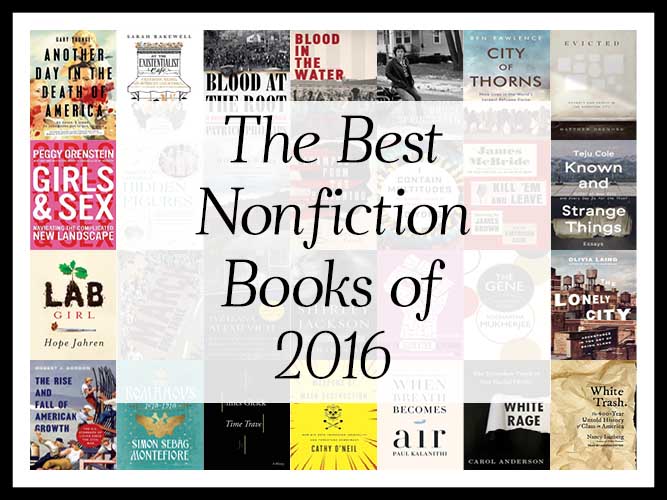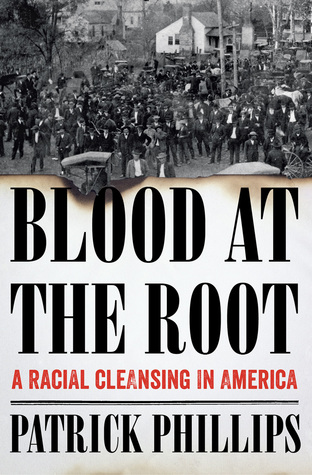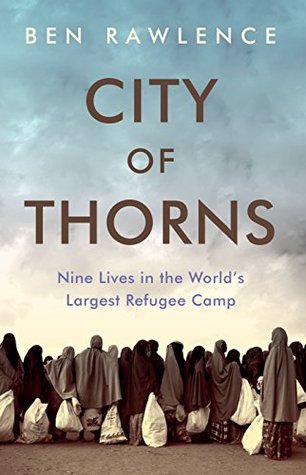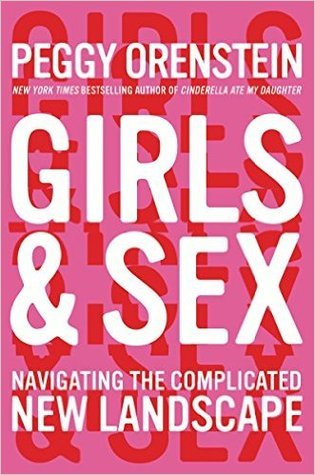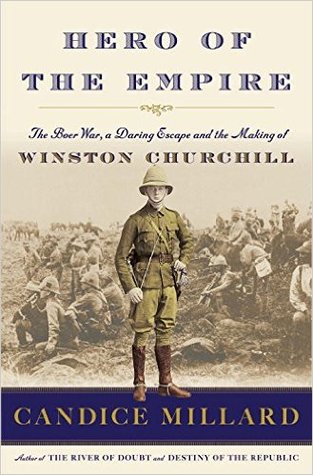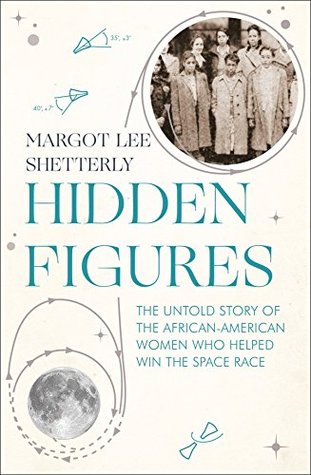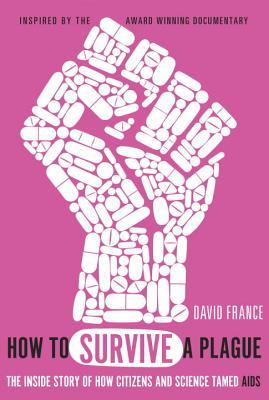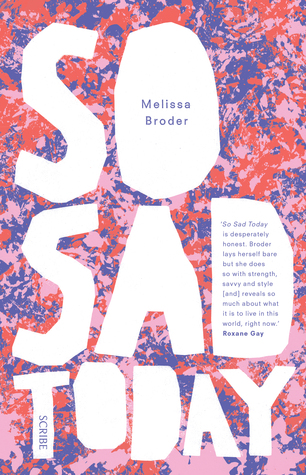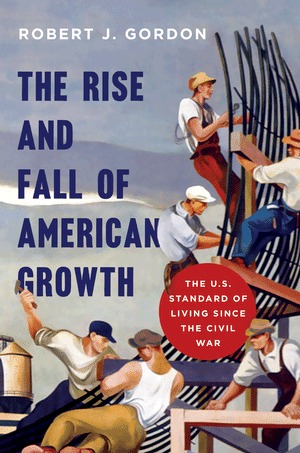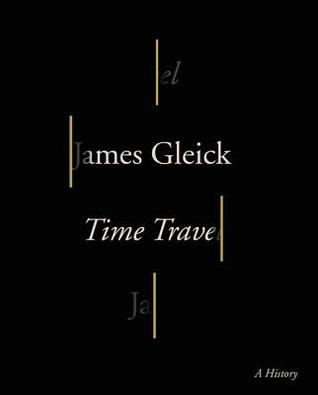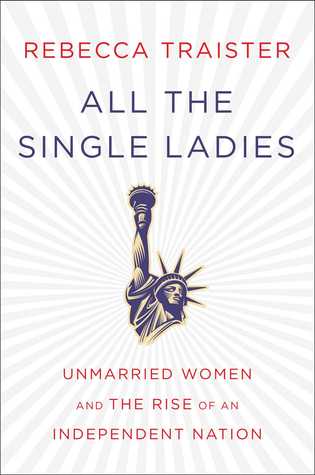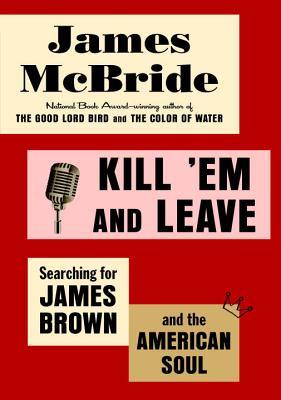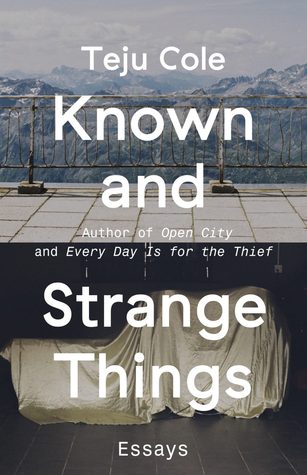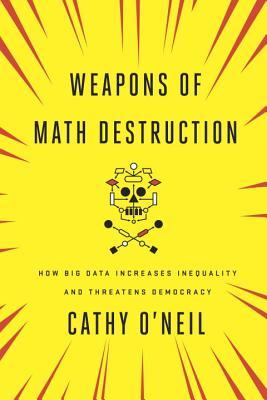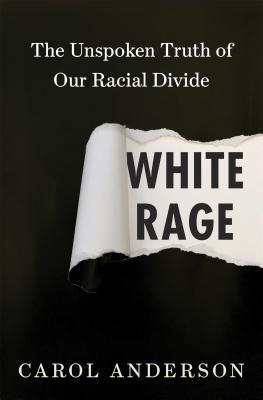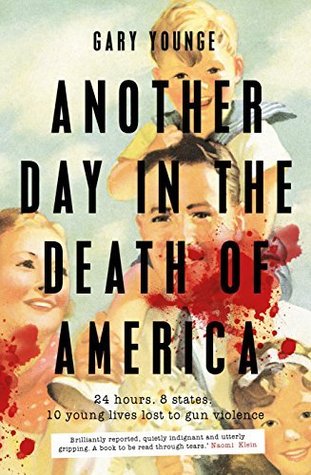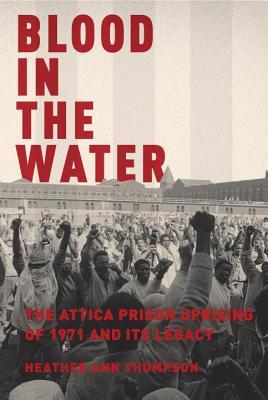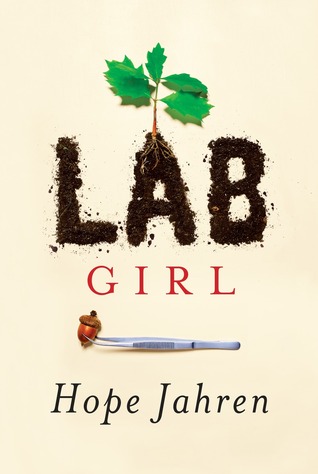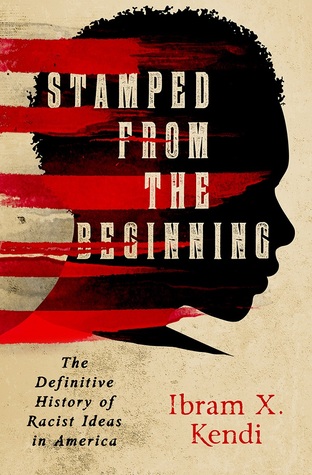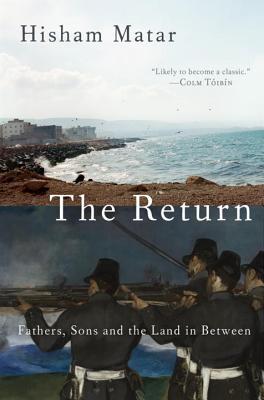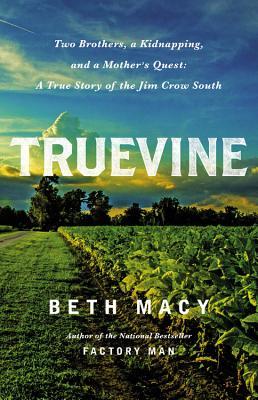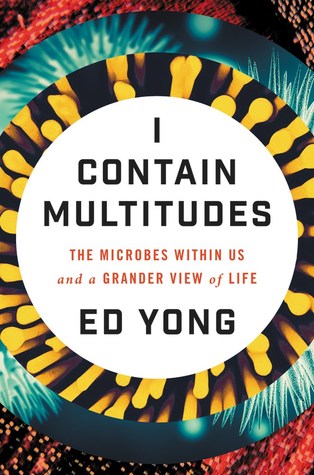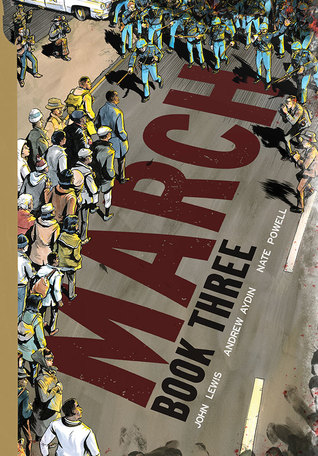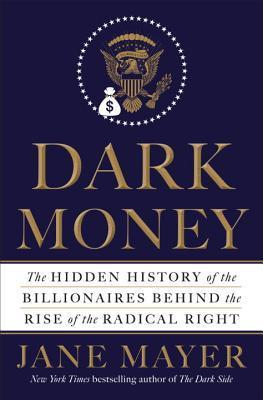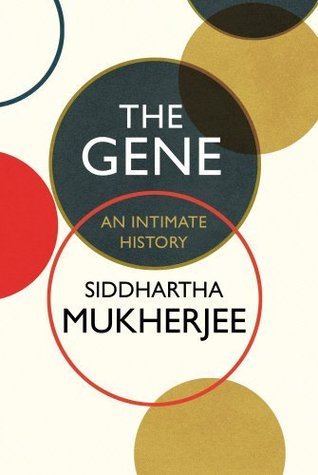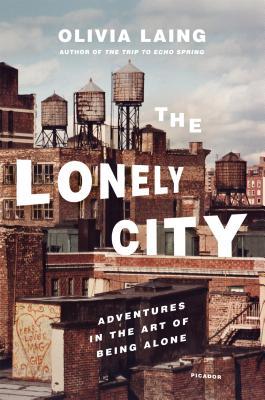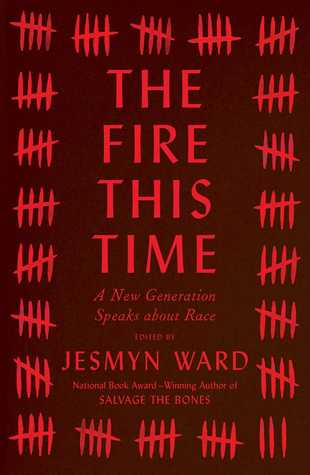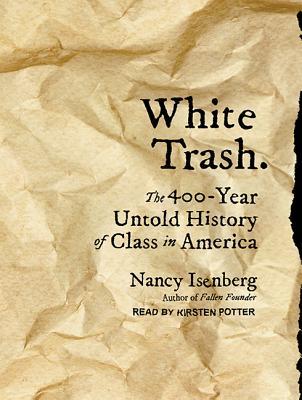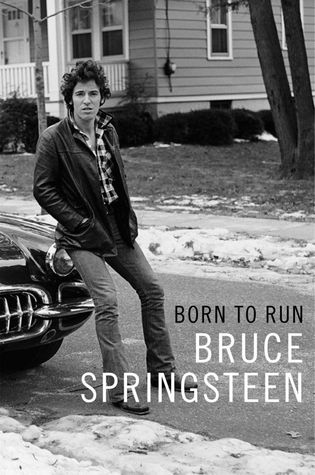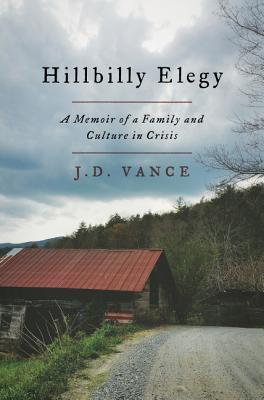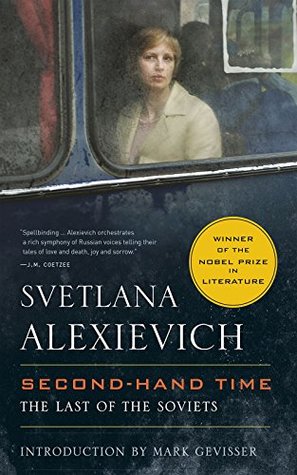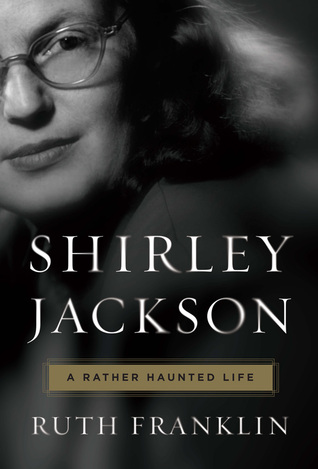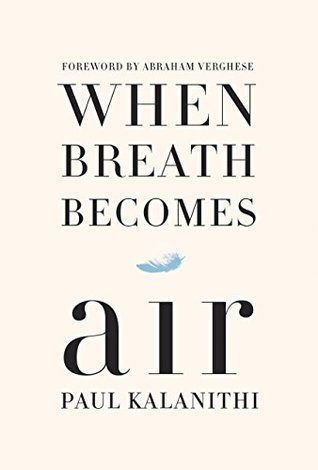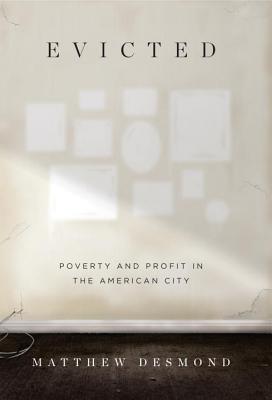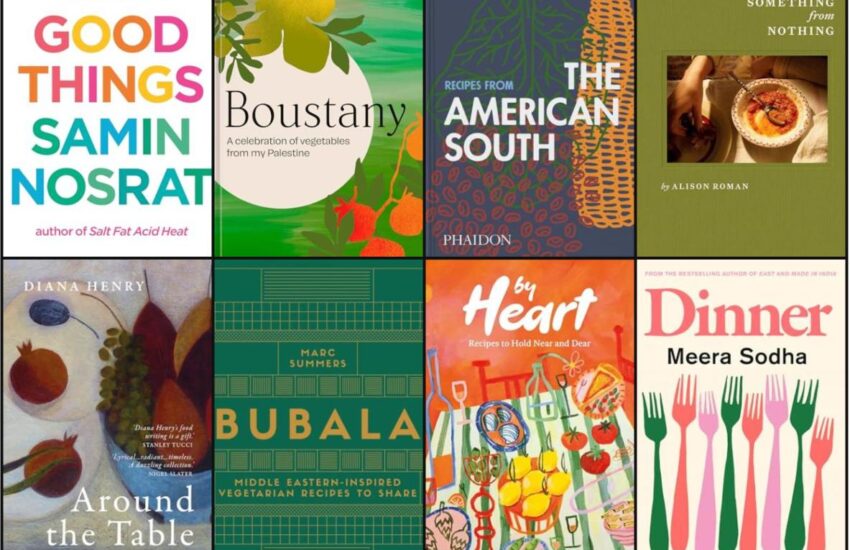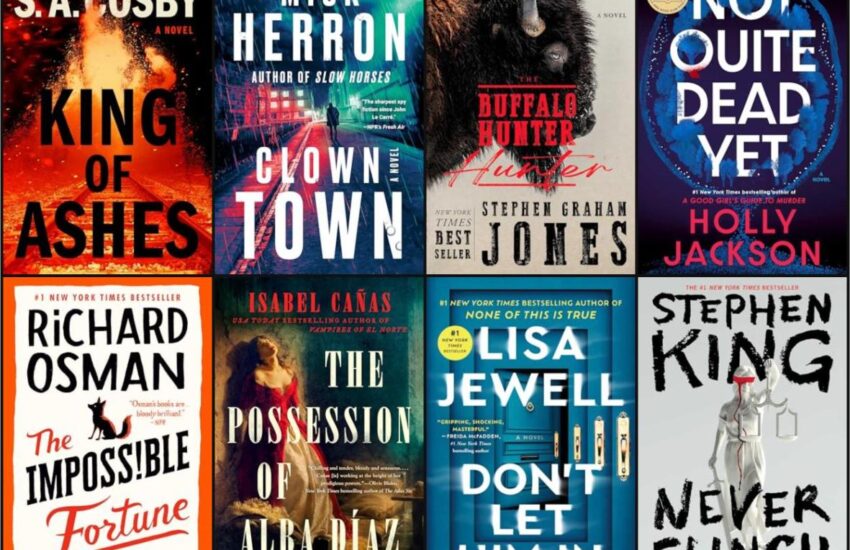The Best Nonfiction Books of 2016 (A Year-End List Aggregation)
“What are the best Nonfiction books of 2016?” We aggregated 49 year-end lists and ranked the 582 unique titles by how many times they appeared in an attempt to answer that very question!
There are thousands of year-end lists released every year and, like we do in our weekly Best Book articles, we wanted to see which books appear on them the most. We used 49 nonfiction book lists and found 582 unique titles. The top 35 books, all appearing on 4 or more lists, are below with images, summaries, and links for learning more or purchasing. The remaining books, along with the articles we used, can be found at the bottom of the page.
Be sure to check out our other Best Book of the year lists:
- The Best Fiction Books of 2016
- The Best Cookbooks of 2016
- The Best Art & Photography Books of 2016
- The Best Graphic Novels & Comics of 2016
- The Best Poetry Books of 2016
- The Best Biography & Memoir Books of 2016
- The Best Science & Nature Books of 2016
- The Best History Books of 2016
- The Best Science Fiction & Fantasy Books of 2016
And if you want to see how they compare to last year, take a look at the 2015 lists as well!
Happy Scrolling!
The Top Nonfiction Books of 2016
35 .) At the Existentialist Café: Freedom, Being, and Apricot Cocktails by Sarah Bakewell
- Boston Globe
- NY Times
- San Francisco Chronicle 2
- Amazon
“Paris, 1933: three contemporaries meet over apricot cocktails at the Bec-de-Gaz bar on the rue Montparnasse. They are the young Jean-Paul Sartre, Simone de Beauvoir, and longtime friend Raymond Aron, a fellow philosopher who raves to them about a new conceptual framework from Berlin called Phenomenology. “You see,” he says, “if you are a phenomenologist you can talk about this cocktail and make philosophy out of it!”
It was this simple phrase that would ignite a movement, inspiring Sartre to integrate Phenomenology into his own French, humanistic sensibility, thereby creating an entirely new philosophical approach inspired by themes of radical freedom, authentic being, and political activism. This movement would sweep through the jazz clubs and cafés of the Left Bank before making its way across the world as Existentialism.”
34 .) Blood at the Root: A Racial Cleansing in America by Patrick Phillips
- Hudson Booksellers
- NY Times
- Publishers Weekly
- Boston Globe
“Forsyth County, Georgia, at the turn of the twentieth century was home to a large African American community that included ministers and teachers, farmers and field hands, tradesmen, servants, and children. Many black residents were poor sharecroppers, but others owned their own farms and the land on which they’d founded the county’s thriving black churches.
But then in September of 1912, three young black laborers were accused of raping and murdering a white girl. One man was dragged from a jail cell and lynched on the town square, two teenagers were hung after a one-day trial, and soon bands of white “night riders” launched a coordinated campaign of arson and terror, driving all 1,098 black citizens out of the county. In the wake of the expulsions, whites harvested the crops and took over the livestock of their former neighbors, and quietly laid claim to “abandoned” land. The charred ruins of homes and churches disappeared into the weeds, until the people and places of black Forsyth were forgotten.”
33 .) City of Thorns: Nine Lives in the World’s Largest Refugee Camp by Ben Rawlence
- Hudson Booksellers
- Kirkus
- The Globe and Mail
- The Economist
“Situated hundreds of miles from any other settlement, deep within the inhospitable desert of northern Kenya where only thorn bushes grow, Dadaab is a city like no other. Its buildings are made from mud, sticks, or plastic. Its entire economy is grey. And its citizens survive on rations and luck. Over the course of four years, Ben Rawlence became a firsthand witness to a strange and desperate place, getting to know many of those who had come seeking sanctuary. Among them are Guled, a former child soldier who lives for football; Nisho, who scrapes an existence by pushing a wheelbarrow and dreaming of riches; Tawane, the indomitable youth leader; and Kheyro, a student whose future hangs upon her education.
In City of Thorns, Rawlence interweaves the stories of nine individuals to show what life is like in the camp, sketching the wider political forces that keep the refugees trapped. Lucid, vivid, and illuminating, City of Thorns is an urgent human story with deep international repercussions, brought to life through the people who call Dabaab home.”
32 .) Girls & Sex: Navigating the Complicated New Landscape by Peggy Orenstein
- Amazon
- Goodreads
- San Francisco Chronicle 2
- Time
“A generation gap has emerged between parents and their girls. Even in this age of helicopter parenting, the mothers and fathers of tomorrow’s women have little idea what their daughters are up to sexually or how they feel about it. Drawing on in-depth interviews with over seventy young women and a wide range of psychologists, academics, and experts, renowned journalist Peggy Orenstein goes where most others fear to tread, pulling back the curtain on the hidden truths, hard lessons, and important possibilities of girls’ sex lives in the modern world.
While the media has focused—often to sensational effect—on the rise of casual sex and the prevalence of rape on campus, in Girls and Sex Peggy Orenstein brings much more to the table. She examines the ways in which porn and all its sexual myths have seeped into young people’s lives; what it means to be the “the perfect slut” and why many girls scorn virginity; the complicated terrain of hookup culture and the unfortunate realities surrounding assault. In Orenstein’s hands these issues are never reduced to simplistic “truths;” rather, her powerful reporting opens up a dialogue on a potent, often silent, subtext of American life today—giving readers comprehensive and in-depth information with which to understand, and navigate, this complicated new world.”
31 .) Hero of the Empire: The Boer War, a Daring Escape and the Making of Winston Churchill by Candice Millard
- Good Books Guide
- NPR
- NY Times
- Washington Post
“At age twenty-four, Winston Churchill was utterly convinced it was his destiny to become prime minister of England one day, despite the fact he had just lost his first election campaign for Parliament. He believed that to achieve his goal he must do something spectacular on the battlefield. Despite deliberately putting himself in extreme danger as a British Army officer in colonial wars in India and Sudan, and as a journalist covering a Cuban uprising against the Spanish, glory and fame had eluded him.
Churchill arrived in South Africa in 1899, valet and crates of vintage wine in tow, there to cover the brutal colonial war the British were fighting with Boer rebels. But just two weeks after his arrival, the soldiers he was accompanying on an armored train were ambushed, and Churchill was taken prisoner. Remarkably, he pulled off a daring escape–but then had to traverse hundreds of miles of enemy territory, alone, with nothing but a crumpled wad of cash, four slabs of chocolate, and his wits to guide him.
“
30 .) Hidden Figures: The American Dream And The Untold Story Of The Black Women Mathematicians Who Helped Win The Space Race by Margot Lee Shetterly
- Time
- Buzzfeed
- NPR
- Publishers Weekly
“Before John Glenn orbited the earth, or Neil Armstrong walked on the moon, a group of dedicated female mathematicians known as “human computers” used pencils, slide rules and adding machines to calculate the numbers that would launch rockets, and astronauts, into space.
Among these problem-solvers were a group of exceptionally talented African American women, some of the brightest minds of their generation. Originally relegated to teaching math in the South’s segregated public schools, they were called into service during the labor shortages of World War II, when America’s aeronautics industry was in dire need of anyone who had the right stuff. Suddenly, these overlooked math whizzes had a shot at jobs worthy of their skills, and they answered Uncle Sam’s call, moving to Hampton, Virginia and the fascinating, high-energy world of the Langley Memorial Aeronautical Laboratory.”
29 .) How to Survive a Plague: The Inside Story of How Citizens and Science Tamed AIDS by David France
- Entropy
- Buzzfeed
- NY Times
- San Francisco Chronicle
“A riveting, powerful telling of the story of the grassroots movement of activists, many of them in a life-or-death struggle, who seized upon scientific research to help develop the drugs that turned HIV from a mostly fatal infection to a manageable disease. Ignored by public officials, religious leaders, and the nation at large, and confronted with shame and hatred, this small group of men and women chose to fight for their right to live by educating themselves and demanding to become full partners in the race for effective treatments. Around the globe, 16 million people are alive today thanks to their efforts.
Not since the publication of Randy Shilts’s classic And the Band Played On has a book measured the AIDS plague in such brutally human, intimate, and soaring terms.”
28 .) So Sad Today: Personal Essays by Melissa Broder
- Entropy
- The Globe and Mail
- NPR
- Publishers Weekly
Melissa Broder always struggled with anxiety. In the fall of 2012, she went through a harrowing cycle of panic attacks and dread that wouldn’t abate for months. So she began @sosadtoday, an anonymous Twitter feed that allowed her to express her darkest feelings, and which quickly gained a dedicated following. In SO SAD TODAY, Broder delves deeper into the existential themes she explores on Twitter, grappling with sex, death, love low self-esteem, addiction, and the drama of waiting for the universe to text you back. With insights as sharp as her humor, Broder explores–in prose that is both ballsy and beautiful, aggressively colloquial and achingly poetic–questions most of us are afraid to even acknowledge, let alone answer, in order to discover what it really means to be a person in this modern world.
27 .) The Rise and Fall of American Growth: The US Standard of Living since the Civil War by Robert J Gordon
- Five Books
- NY Times
- Daniel H. Pink
- The Economist
In the century after the Civil War, an economic revolution improved the American standard of living in ways previously unimaginable. Electric lighting, indoor plumbing, motor vehicles, air travel, and television transformed households and workplaces. But has that era of unprecedented growth come to an end? Weaving together a vivid narrative, historical anecdotes, and economic analysis, The Rise and Fall of American Growth challenges the view that economic growth will continue unabated, and demonstrates that the life-altering scale of innovations between 1870 and 1970 cannot be repeated. Gordon contends that the nation’s productivity growth will be further held back by the headwinds of rising inequality, stagnating education, an aging population, and the rising debt of college students and the federal government, and that we must find new solutions. A critical voice in the most pressing debates of our time, The Rise and Fall of American Growth is at once a tribute to a century of radical change and a harbinger of tougher times to come.
26 .) Time Travel: A History by James Gleick
- MPR News
- Buzzfeed
- Boston Globe
- San Francisco Chronicle 2
The story begins at the turn of the previous century, with the young H. G. Wells writing and rewriting the fantastic tale that became his first book and an international sensation: The Time Machine. It was an era when a host of forces was converging to transmute the human understanding of time, some philosophical and some technological: the electric telegraph, the steam railroad, the discovery of buried civilizations, and the perfection of clocks. James Gleick tracks the evolution of time travel as an idea that becomes part of contemporary culture—from Marcel Proust to Doctor Who, from Jorge Luis Borges to Woody Allen. He investigates the inevitable looping paradoxes and examines the porous boundary between pulp fiction and modern physics. Finally, he delves into a temporal shift that is unsettling our own moment: the instantaneous wired world, with its all-consuming present and vanishing future.
25 .) All The Single Ladies: Unmarried Women And The Rise Of An Independent Nation by Rebecca Traister
- MPR News
- NPR
- The Globe and Mail
- Boston Globe
- NY Times
“The New York Times bestselling investigation into the sexual, economic, and emotional lives of women is “an informative and thought-provoking book for anyone—not just the single ladies—who want to gain a greater understanding of this pivotal moment in the history of the United States” (The New York Times Book Review).
In 2009, award-winning journalist Rebecca Traister started All the Single Ladies about the twenty-first century phenomenon of the American single woman. It was the year the proportion of American women who were married dropped below fifty percent; and the median age of first marriages, which had remained between twenty and twenty-two years old for nearly a century (1890–1980), had risen dramatically to twenty-seven.
But over the course of her vast research and more than a hundred interviews with academics and social scientists and prominent single women, Traister discovered a startling truth: the phenomenon of the single woman in America is not a new one. And historically, when women were given options beyond early heterosexual marriage, the results were massive social change—temperance, abolition, secondary education, and more. Today, only twenty percent of Americans are married by age twenty-nine, compared to nearly sixty percent in 1960. “
24 .) Kill ‘Em and Leave: Searching for James Brown and the American Soul by James McBride
- NPR
- Tampa Bay Times
- Time
- Boston Globe
- San Francisco Chronicle 2
Kill ’Em and Leave is more than a book about James Brown. Brown’s rough-and-tumble life, through McBride’s lens, is an unsettling metaphor for American life: the tension between North and South, black and white, rich and poor. McBride’s travels take him to forgotten corners of Brown’s never-before-revealed history: the country town where Brown’s family and thousands of others were displaced by America’s largest nuclear power bomb-making facility; a South Carolina field where a long-forgotten cousin recounts, in the dead of night, a fuller history of Brown’s sharecropping childhood, which until now has been a mystery. McBride seeks out the American expatriate in England who co-created the James Brown sound, visits the trusted right-hand manager who worked with Brown for forty-one years, and interviews Brown’s most influential nonmusical creation, his “adopted son,” the Reverend Al Sharpton. He describes the stirring visit of Michael Jackson to the Augusta, Georgia, funeral home where the King of Pop sat up all night with the body of his musical godfather, spends hours talking with Brown’s first wife, and lays bare the Dickensian legal contest over James Brown’s estate, a fight that has consumed careers; prevented any money from reaching the poor schoolchildren in Georgia and South Carolina, as instructed in his will; cost Brown’s estate millions in legal fees; and left James Brown’s body to lie for more than eight years in a gilded coffin in his daughter’s yard in South Carolina.
23 .) Known and Strange Things: Essays by Teju Cole
- Time
- Largehearted Boy
- The Undefeated
- San Francisco Chronicle 2
- Good Books Guide
“With this collection of more than fifty pieces on politics, photography, travel, history, and literature, Teju Cole solidifies his place as one of today’s most powerful and original voices. On page after page, deploying prose dense with beauty and ideas, he finds fresh and potent ways to interpret art, people, and historical moments, taking in subjects from Virginia Woolf, Shakespeare, and W. G. Sebald to Instagram, Barack Obama, and Boko Haram. Cole brings us new considerations of James Baldwin in the age of Black Lives Matter; the African American photographer Roy DeCarava, who, forced to shoot with film calibrated exclusively for white skin tones, found his way to a startling and true depiction of black subjects; and (in an essay that inspired both praise and pushback when it first appeared) the White Savior Industrial Complex, the system by which African nations are sentimentally aided by an America “developed on pillage.”
Persuasive and provocative, erudite yet accessible, Known and Strange Things is an opportunity to live within Teju Cole’s wide-ranging enthusiasms, curiosities, and passions, and a chance to see the world in surprising and affecting new frames.”
22 .) Weapons of Math Destruction: How Big Data Increases Inequality and Threatens Democracy by Cathy O’Neil
- MPR News
- Buzzfeed
- NY Times
- Boston Globe
- Verso
“We live in the age of the algorithm. Increasingly, the decisions that affect our lives—where we go to school, whether we get a car loan, how much we pay for health insurance—are being made not by humans, but by mathematical models. In theory, this should lead to greater fairness: Everyone is judged according to the same rules, and bias is eliminated.
But as Cathy O’Neil reveals in this urgent and necessary book, the opposite is true. The models being used today are opaque, unregulated, and uncontestable, even when they’re wrong. Most troubling, they reinforce discrimination: If a poor student can’t get a loan because a lending model deems him too risky (by virtue of his zip code), he’s then cut off from the kind of education that could pull him out of poverty, and a vicious spiral ensues. Models are propping up the lucky and punishing the downtrodden, creating a “toxic cocktail for democracy.” Welcome to the dark side of Big Data.”
21 .) White Rage: The Unspoken Truth of Our Racial Divide by Carol Anderson
- Chicago Review of Books
- NY Times
- The Globe and Mail
- Washington Post
- Boston Globe
“As Ferguson, Missouri, erupted in August 2014, and media commentators across the ideological spectrum referred to the angry response of African Americans as “black rage,” historian Carol Anderson wrote a remarkable op-ed in the Washington Post showing that this was, instead, “white rage at work. With so much attention on the flames,” she writes, “everyone had ignored the kindling.”
Since 1865 and the passage of the Thirteenth Amendment, every time African Americans have made advances towards full participation in our democracy, white reaction has fueled a deliberate and relentless rollback of their gains. The end of the Civil War and Reconstruction was greeted with the Black Codes and Jim Crow; the Supreme Court’s landmark 1954 Brown v. Board of Education decision was met with the shutting down of public schools throughout the South while taxpayer dollars financed segregated white private schools; the Civil Rights Act of 1964 and Voting Rights Act of 1965 triggered a coded but powerful response, the so-called Southern Strategy and the War on Drugs that disenfranchised millions of African Americans while propelling presidents Nixon and Reagan into the White House.”
20 .) The Romanovs: 1613-1918 by Simon Sebag Montefiore.
- Dayton Daily News
- Good Books Guide
- NPR
- Washington Post
- The Economist
- The Spinoff
“This is the intimate story of twenty tsars and tsarinas, some touched by genius, some by madness, but all inspired by holy autocracy and imperial ambition. Simon Sebag Montefiore’s gripping chronicle reveals their secret world of unlimited power and ruthless empire-building, overshadowed by palace conspiracy, family rivalries, sexual decadence and wild extravagance, with a global cast of adventurers, courtesans, revolutionaries and poets, from Ivan the Terrible to Tolstoy and Pushkin, to Bismarck, Lincoln, Queen Victoria and Lenin.
To rule Russia was both imperial-sacred mission and poisoned chalice: six of the last twelve tsars were murdered. Peter the Great tortured his own son to death while making Russia an empire, and dominated his court with a dining club notable for compulsory drunkenness, naked dwarfs and fancy dress. Catherine the Great overthrew her own husband (who was murdered soon afterward), enjoyed affairs with a series of young male favorites, conquered Ukraine and fascinated Europe. Paul I was strangled by courtiers backed by his own son, Alexander I, who in turn faced Napoleon’s invasion and the burning of Moscow, then went on to take Paris. Alexander II liberated the serfs, survived five assassination attempts and wrote perhaps the most explicit love letters ever composed by a ruler. The Romanovs climaxes with a fresh, unforgettable portrayal of Nicholas II and Alexandra, the rise and murder of Rasputin, war and revolution—and the harrowing massacre of the entire family.”
19 .) Another Day in the Death of America: A Chronicle of Ten Short Lives by Gary Younge
- Chicago Tribune
- Goodreads
- Kirkus
- Publishers Weekly
- The Economist
- Shelf Awareness
“On an average day in America, seven children and teens will be shot dead. In Another Day in the Death of America, award-winning journalist Gary Younge tells the stories of the lives lost during one such day. It could have been any day, but he chose November 23, 2013. Black, white, and Latino, aged nine to nineteen, they fell at sleepovers, on street corners, in stairwells, and on their own doorsteps. From the rural Midwest to the barrios of Texas, the narrative crisscrosses the country over a period of twenty-four hours to reveal the full human stories behind the gun-violence statistics and the brief mentions in local papers of lives lost.
This powerful and moving work puts a human face—a child’s face—on the “collateral damage” of gun deaths across the country. This is not a book about gun control, but about what happens in a country where it does not exist. What emerges in these pages is a searing and urgent portrait of youth, family, and firearms in America today.”
18 .) Blood in the Water: The Attica Prison Uprising of 1971 and Its Legacy by Heather Ann Thompson
- The Christian Science Monitor
- Kirkus
- NY Times
- Publishers Weekly
- The Undefeated
- Boston Globe
“On September 9, 1971, nearly 1,300 prisoners took over the Attica Correctional Facility in upstate New York to protest years of mistreatment. Holding guards and civilian employees hostage, the prisoners negotiated with officials for improved conditions during the four long days and nights that followed.
On September 13, the state abruptly sent hundreds of heavily armed troopers and correction officers to retake the prison by force. Their gunfire killed thirty-nine men—hostages as well as prisoners—and severely wounded more than one hundred others. In the ensuing hours, weeks, and months, troopers and officers brutally retaliated against the prisoners. And, ultimately, New York State authorities prosecuted only the prisoners, never once bringing charges against the officials involved in the retaking and its aftermath and neglecting to provide support to the survivors and the families of the men who had been killed.
Drawing from more than a decade of extensive research, historian Heather Ann Thompson sheds new light on every aspect of the uprising and its legacy, giving voice to all those who took part in this forty-five-year fight for justice: prisoners, former hostages, families of the victims, lawyers and judges, and state officials and members of law enforcement. Blood in the Water is the searing and indelible account of one of the most important civil rights stories of the last century.”
17 .) Lab Girl by Hope Jahren
- NPR
- NY Times
- Star Tribune
- Time
- Shelf Awareness
- Daniel H. Pink
“An illuminating debut memoir of a woman in science; a moving portrait of a longtime friendship; and a stunningly fresh look at plants that will forever change how you see the natural world
Acclaimed scientist Hope Jahren has built three laboratories in which she’s studied trees, flowers, seeds, and soil. Her first book is a revelatory treatise on plant life—but it is also so much more.
Lab Girl is a book about work, love, and the mountains that can be moved when those two things come together. It is told through Jahren’s remarkable stories: about her childhood in rural Minnesota with an uncompromising mother and a father who encouraged hours of play in his classroom’s labs; about how she found a sanctuary in science, and learned to perform lab work done “with both the heart and the hands”; and about the inevitable disappointments, but also the triumphs and exhilarating discoveries, of scientific work.”
16 .) Stamped from the Beginning: The Definitive History of Racist Ideas in America by Ibram X. Kendi
- Chicago Review of Books
- Buzzfeed
- Entropy
- Kirkus
- Washington Post
- Boston Globe
“In this deeply researched and fast-moving narrative, Kendi chronicles the entire story of anti-Black racist ideas and their staggering power over the course of American history. Stamped from the Beginning uses the life stories of five major American intellectuals to offer a window into the contentious debates between assimilationists and segregationists and between racists and antiracists. From Puritan minister Cotton Mather to Thomas Jefferson, from fiery abolitionist William Lloyd Garrison to brilliant scholar W.E.B. Du Bois to legendary anti-prison activist Angela Davis, Kendi shows how and why some of our leading proslavery and pro-civil rights thinkers have challenged or helped cement racist ideas in America.
Contrary to popular conceptions, racist ideas did not arise from ignorance or hatred. Instead, they were devised and honed by some of the most brilliant minds of each era. These intellectuals used their brilliance to justify and rationalize deeply entrenched discriminatory policies and the nation’s racial disparities in everything from wealth to health. And while racist ideas are easily produced and easily consumed, they can also be discredited. In shedding much-needed light on the murky history of racist ideas, Stamped from the Beginning offers us the tools we need to expose them–and in the process, gives us reason to hope.”
15 .) The Return: Fathers, Sons and the Land In Between by Hisham Matar
- Five Books
- MPR News
- Good Books Guide
- NPR
- NY Times
- The Economist
“When Hisham Matar was a nineteen-year-old university student in England, his father was kidnapped. One of the Qaddafi regime’s most prominent opponents in exile, he was held in a secret prison in Libya. Hisham would never see him again. But he never gave up hope that his father might still be alive. “Hope,” as he writes, “is cunning and persistent.”
Twenty-two years later, after the fall of Qaddafi, the prison cells are empty and there is no sign of Jaballa Matar. Hisham returns with his mother and wife to the homeland he never thought he’d go back to again. The Return is the story of what he found there. It is at once an exquisite meditation on history, politics, and art, a brilliant portrait of a nation and a people on the cusp of change, and a disquieting depiction of the brutal legacy of absolute power. Above all, it is a universal tale of loss and love and of one family’s life. Hisham Matar asks the harrowing question: How does one go on living in the face of a loved one’s uncertain fate?”
14 .) Truevine – Two Brothers, a Kidnapping, and a Mother’s Quest: A True Story of the Jim Crow South by Beth Macy
- MPR News
- Dayton Daily News
- Kirkus
- Tampa Bay Times
- San Francisco Chronicle
- NY Times
“The year was 1899 and the place a sweltering tobacco farm in the Jim Crow South town of Truevine, Virginia. George and Willie Muse were two little boys born to a sharecropper family. One day a white man offered them a piece of candy, setting off events that would take them around the world and change their lives forever.
Captured into the circus, the Muse brothers performed for royalty at Buckingham Palace and headlined over a dozen sold-out shows at New York’s Madison Square Garden. They were global superstars in a pre-broadcast era. But the very root of their success was in the color of their skin and in the outrageous caricatures they were forced to assume: supposed cannibals, sheep-headed freaks, even “”Ambassadors from Mars.”” Back home, their mother never accepted that they were “”gone”” and spent 28 years trying to get them back.”
13 .) I Contain Multitudes: The Microbes Within Us and a Grander View of Life by Ed Yong
- MPR News
- Buzzfeed
- Medium
- NPR
- NY Times
- Publishers Weekly
- Star Tribune
“Joining the ranks of popular science classics like The Botany of Desire and The Selfish Gene, a groundbreaking, wondrously informative, and vastly entertaining examination of the most significant revolution in biology since Darwin—a “microbe’s-eye view” of the world that reveals a marvelous, radically reconceived picture of life on earth.
Every animal, whether human, squid, or wasp, is home to millions of bacteria and other microbes. Ed Yong, whose humor is as evident as his erudition, prompts us to look at ourselves and our animal companions in a new light—less as individuals and more as the interconnected, interdependent multitudes we assuredly are.
The microbes in our bodies are part of our immune systems and protect us from disease. In the deep oceans, mysterious creatures without mouths or guts depend on microbes for all their energy. Bacteria provide squid with invisibility cloaks, help beetles to bring down forests, and allow worms to cause diseases that afflict millions of people.”
12 .) March: Book Three by John Lewis, Andrew Aydin, and Nate Powell
- Buzzfeed
- Chicago Tribune
- Time
- Bookriot
- NPR
- The Horn Book
- Daniel H. Pink
“By the fall of 1963, the Civil Rights Movement has penetrated deep into the American consciousness, and as chairman of the Student Nonviolent Coordinating Committee, John Lewis is guiding the tip of the spear. Through relentless direct action, SNCC continues to force the nation to confront its own blatant injustice, but for every step forward, the danger grows more intense: Jim Crow strikes back through legal tricks, intimidation, violence, and death. The only hope for lasting change is to give voice to the millions of Americans silenced by voter suppression: “”One Man, One Vote.””
To carry out their nonviolent revolution, Lewis and an army of young activists launch a series of innovative campaigns, including the Freedom Vote, Mississippi Freedom Summer, and an all-out battle for the soul of the Democratic Party waged live on national television.
With these new struggles come new allies, new opponents, and an unpredictable new president who might be both at once. But fractures within the movement are deepening … even as 25-year-old John Lewis prepares to risk everything in a historic showdown high above the Alabama river, in a town called Selma.”
11 .) Dark Money: The Hidden History of the Billionaires Behind the Rise of the Radical Right by Jane Mayer
- Ripr
- Goodreads
- Caroline County Public Library
- Medium
- NPR
- NY Times
- Washington Post
- San Francisco Chronicle
“Why is America living in an age of profound economic inequality? Why, despite the desperate need to address climate change, have even modest environmental efforts been defeated again and again? Why have protections for employees been decimated? Why do hedge-fund billionaires pay a far lower tax rate than middle-class workers?
The conventional answer is that a popular uprising against “big government” led to the ascendancy of a broad-based conservative movement. But as Jane Mayer shows in this powerful, meticulously reported history, a network of exceedingly wealthy people with extreme libertarian views bankrolled a systematic, step-by-step plan to fundamentally alter the American political system.
The network has brought together some of the richest people on the planet. Their core beliefs—that taxes are a form of tyranny; that government oversight of business is an assault on freedom—are sincerely held. But these beliefs also advance their personal and corporate interests: Many of their companies have run afoul of federal pollution, worker safety, securities, and tax laws.”
10 .) The Gene: An Intimate History by Siddhartha Mukherjee
- Hudson Booksellers
- Marginal Revolution
- NPR
- NY Times
- Seattle Times
- The Globe and Mail
- San Francisco Chronicle 2
- Medium
“Siddhartha Mukherjee has a written a biography of the gene as deft, brilliant, and illuminating as his extraordinarily successful biography of cancer. Weaving science, social history, and personal narrative to tell us the story of one of the most important conceptual breakthroughs of modern times, Mukherjee animates the quest to understand human heredity and its surprising influence on our lives, personalities, identities, fates, and choices.
Throughout the narrative, the story of Mukherjee’s own family—with its tragic and bewildering history of mental illness—cuts like a bright, red line, reminding us of the many questions that hang over our ability to translate the science of genetics from the laboratory to the real world. In superb prose and with an instinct for the dramatic scene, he describes the centuries of research and experimentation—from Aristotle and Pythagoras to Mendel and Darwin, from Boveri and Morgan to Crick, Watson and Franklin, all the way through the revolutionary twenty-first century innovators who mapped the human genome.”
9 .) The Lonely City: Adventures in the Art of Being Alone by Olivia Laing
- Verso
- Entropy
- Good Books Guide
- Goodreads
- NPR
- Publishers Weekly
- The Globe and Mail
- The Spinoff
“What does it mean to be lonely? How do we live, if we’re not intimately engaged with another human being? How do we connect with other people? Does technology draw us closer together or trap us behind screens?
When Olivia Laing moved to New York City in her mid-thirties, she found herself inhabiting loneliness on a daily basis. Increasingly fascinated by this most shameful of experiences, she began to explore the lonely city by way of art. Moving fluidly between works and lives – from Edward Hopper’s Nighthawks to Andy Warhol’s Time Capsules, from Henry Darger’s hoarding to David Wojnarowicz’s AIDS activism – Laing conducts an electric, dazzling investigation into what it means to be alone.”
8 .) The Fire This Time: A New Generation Speaks About Race by Jesmyn Ward
- Bookriot
- Buzzfeed
- Entropy
- Goodreads
- MPR News
- NPR
- Publishers Weekly
- San Francisco Chronicle 2
- The Undefeated
“In light of recent tragedies and widespread protests across the nation, The Progressive magazine republished one of its most famous pieces: James Baldwin’s 1962 “Letter to My Nephew,” which was later published in his landmark book, The Fire Next Time. Addressing his fifteen-year-old namesake on the one hundredth anniversary of the Emancipation Proclamation, Baldwin wrote: “You know and I know, that the country is celebrating one hundred years of freedom one hundred years too soon.”
Award-winning author Jesmyn Ward knows that Baldwin’s words ring as true as ever today. In response, she has gathered short essays, memoir, and a few essential poems to engage the question of race in the United States. And she has turned to some of her generation’s most original thinkers and writers to give voice to their concerns.”
7 .) White Trash, the 400-year untold story of class in America by Nancy Isenberg
- Brian Fanelli
- MPR News
- NPR
- NY Times
- Publishers Weekly
- Ripr
- San Francisco Chronicle 2
- The Globe and Mail
- Washington Post
Surveying political rhetoric and policy, popular literature and scientific theories over four hundred years, Isenberg upends assumptions about America’s supposedly class-free society––where liberty and hard work were meant to ensure real social mobility. Poor whites were central to the rise of the Republican Party in the early nineteenth century, and the Civil War itself was fought over class issues nearly as much as it was fought over slavery. Reconstruction pitted poor white trash against newly freed slaves, which factored in the rise of eugenics–-a widely popular movement embraced by Theodore Roosevelt that targeted poor whites for sterilization. These poor were at the heart of New Deal reforms and LBJ’s Great Society; they haunt us in reality TV shows like Here Comes Honey Boo Boo and Duck Dynasty. Marginalized as a class, white trash have always been at or near the center of major political debates over the character of the American identity.
6 .) Born To Run by Bruce Springsteen
- Buzzfeed
- Medium
- NPR
- NY Times
- Philly
- Publishers Weekly
- San Francisco Chronicle 2
- Tampa Bay Times
- The Economist
- The Globe and Mail
“Born to Run will be revelatory for anyone who has ever enjoyed Bruce Springsteen, but this book is much more than a legendary rock star’s memoir. This is a book for workers and dreamers, parents and children, lovers and loners, artists, freaks, or anyone who has ever wanted to be baptized in the holy river of rock and roll.
Rarely has a performer told his own story with such force and sweep. Like many of his songs (“Thunder Road,” “Badlands,” “Darkness on the Edge of Town,” “The River,” “Born in the U.S.A,” “The Rising,” and “The Ghost of Tom Joad,” to name just a few), Bruce Springsteen’s autobiography is written with the lyricism of a singular songwriter and the wisdom of a man who has thought deeply about his experiences. “
5 .) Hillbilly Elegy: A Memoir of a Family and Culture in Crisis by J.D. Vance
- Amazon
- Brian Fanelli
- Englewood Review
- Hudson Booksellers
- NPR
- San Francisco Chronicle 2
- Seattle Times
- The Economist
- Time
- Washington Post
“Hillbilly Elegy is a passionate and personal analysis of a culture in crisis—that of white working-class Americans. The decline of this group, a demographic of our country that has been slowly disintegrating over forty years, has been reported on with growing frequency and alarm, but has never before been written about as searingly from the inside. J. D. Vance tells the true story of what a social, regional, and class decline feels like when you were born with it hung around your neck.
The Vance family story begins hopefully in postwar America. J. D.’s grandparents were “dirt poor and in love,” and moved north from Kentucky’s Appalachia region to Ohio in the hopes of escaping the dreadful poverty around them. They raised a middle-class family, and eventually their grandchild (the author) would graduate from Yale Law School, a conventional marker of their success in achieving generational upward mobility.
But as the family saga of Hillbilly Elegy plays out, we learn that this is only the short, superficial version. Vance’s grandparents, aunt, uncle, sister, and, most of all, his mother, struggled profoundly with the demands of their new middle-class life, and were never able to fully escape the legacy of abuse, alcoholism, poverty, and trauma so characteristic of their part of America. Vance piercingly shows how he himself still carries around the demons of their chaotic family history.”
4 .) Second Hand Time: The Last of the Soviets by Svetlana Alexievich, trans. from the Russian by Bela Shayevich
- Buzzfeed
- Caroline County Public Library
- Five Books
- Good Books Guide
- Kirkus
- NPR
- NY Times
- Publishers Weekly
- Readings
- San Francisco Chronicle
- The Christian Science Monitor
“When the Swedish Academy awarded Svetlana Alexievich the Nobel Prize, it cited her for inventing “a new kind of literary genre,” describing her work as “a history of emotions—a history of the soul.” Alexievich’s distinctive documentary style, combining extended individual monologues with a collage of voices, records the stories of ordinary women and men who are rarely given the opportunity to speak, whose experiences are often lost in the official histories of the nation.
In Secondhand Time, Alexievich chronicles the demise of communism. Everyday Russian citizens recount the past thirty years, showing us what life was like during the fall of the Soviet Union and what it’s like to live in the new Russia left in its wake. Through interviews spanning 1991 to 2012, Alexievich takes us behind the propaganda and contrived media accounts, giving us a panoramic portrait of contemporary Russia and Russians who still carry memories of oppression, terror, famine, massacres—but also of pride in their country, hope for the future, and a belief that everyone was working and fighting together to bring about a utopia. Here is an account of life in the aftermath of an idea so powerful it once dominated a third of the world.
“
3 .) Shirley Jackson: A Rather Haunted Life by Ruth Franklin
- Boston Globe
- Buzzfeed
- Good Books Guide
- MPR News
- NPR
- NY Times
- Publishers Weekly
- San Francisco Chronicle 2
- Seattle Times
- Time
- Washington Post
“The increasingly prescient Jackson emerges as a ferociously talented, determined, and prodigiously creative writer in a time when it was unusual for a woman to have both a family and a profession. A mother of four and the wife of the prominent New Yorker critic and academic Stanley Edgar Hyman, Jackson lived a seemingly bucolic life in the New England town of North Bennington, Vermont. Yet, much like her stories, which channeled the occult while exploring the claustrophobia of marriage and motherhood, Jackson’s creative ascent was haunted by a darker side. As her career progressed, her marriage became more tenuous, her anxiety mounted, and she became addicted to amphetamines and tranquilizers. In sobering detail, Franklin insightfully examines the effects of Jackson’s California upbringing, in the shadow of a hypercritical mother, on her relationship with her husband, juxtaposing Hyman’s infidelities, domineering behavior, and professional jealousy with his unerring admiration for Jackson’s fiction, which he was convinced was among the most brilliant he had ever encountered.
Based on a wealth of previously undiscovered correspondence and dozens of new interviews, Shirley Jackson―an exploration of astonishing talent shaped by a damaging childhood and turbulent marriage―becomes the definitive biography of a generational avatar and an American literary giant.
“
2 .) When Breath Becomes Air by Paul Kalanithi
- Caroline County Public Library
- Entropy
- Hudson Booksellers
- Kirkus
- Medium
- NPR
- NY Times
- Publishers Weekly
- Shelf Awareness
- The Economist
- The Globe and Mail
“At the age of thirty-six, on the verge of completing a decade’s worth of training as a neurosurgeon, Paul Kalanithi was diagnosed with stage IV lung cancer. One day he was a doctor treating the dying, and the next he was a patient struggling to live. And just like that, the future he and his wife had imagined evaporated. When Breath Becomes Air chronicles Kalanithi’s transformation from a naïve medical student “possessed,” as he wrote, “by the question of what, given that all organisms die, makes a virtuous and meaningful life” into a neurosurgeon at Stanford working in the brain, the most critical place for human identity, and finally into a patient and new father confronting his own mortality.
What makes life worth living in the face of death? What do you do when the future, no longer a ladder toward your goals in life, flattens out into a perpetual present? What does it mean to have a child, to nurture a new life as another fades away? These are some of the questions Kalanithi wrestles with in this profoundly moving, exquisitely observed memoir.”
1 .) Evicted: Poverty and Profit in the American City by Matthew Desmond
- Amazon
- Boston Globe
- Buzzfeed
- Chicago Review of Books
- Chicago Tribune
- Daniel H. Pink
- Good Books Guide
- Goodreads
- Kirkus
- MPR News
- NPR
- NY Times
- Publishers Weekly
- San Francisco Chronicle
- Shelf Awareness
- The Christian Science Monitor
“In this brilliant, heartbreaking book, Matthew Desmond takes us into the poorest neighborhoods of Milwaukee to tell the story of eight families on the edge. Arleen is a single mother trying to raise her two sons on the $20 a month she has left after paying for their rundown apartment. Scott is a gentle nurse consumed by a heroin addiction. Lamar, a man with no legs and a neighborhood full of boys to look after, tries to work his way out of debt. Vanetta participates in a botched stickup after her hours are cut. All are spending almost everything they have on rent, and all have fallen behind.
The fates of these families are in the hands of two landlords: Sherrena Tarver, a former schoolteacher turned inner-city entrepreneur, and Tobin Charney, who runs one of the worst trailer parks in Milwaukee. They loathe some of their tenants and are fond of others, but as Sherrena puts it, “Love don’t pay the bills.” She moves to evict Arleen and her boys a few days before Christmas.
Even in the most desolate areas of American cities, evictions used to be rare. But today, most poor renting families are spending more than half of their income on housing, and eviction has become ordinary, especially for single mothers. In vivid, intimate prose, Desmond provides a ground-level view of one of the most urgent issues facing America today. As we see families forced into shelters, squalid apartments, or more dangerous neighborhoods, we bear witness to the human cost of America’s vast inequality—and to people’s determination and intelligence in the face of hardship.”
The Remaining 547 Best Nonfiction Books of 2016
| # | Book | Author | Lists |
| (Appear on 3 Lists Each) | |||
| 36 | A Rage For Order: The Middle East In Turmoil, From Tahrir Square To ISIS | Robert F. Worth | NPR |
| NY Times | |||
| Publishers Weekly | |||
| 37 | Am I Alone Here? Notes on Living to Read and Reading to Live | Peter Orner | Buzzfeed |
| San Francisco Chronicle 2 | |||
| Good Books Guide | |||
| 38 | Bobby Kennedy: The Making of a Liberal Icon | Larry Tye | Conversations Mag |
| Ripr | |||
| Washington Post | |||
| 39 | Born a Crime: Stories from a South African Childhood | Trevor Noah | Good Books Guide |
| NPR | |||
| Philly | |||
| 40 | Boy Erased | Garrard Conley | Largehearted Boy |
| Buzzfeed | |||
| Shelf Awareness | |||
| 41 | Eleanor Roosevelt: The War Years and After: Vol. 3: 1939-1962 | Blanche Wiesen Cook | NPR |
| San Francisco Chronicle 2 | |||
| NY Times | |||
| 42 | Future Sex | Emily Witt | Entropy |
| Verso | |||
| Post Matter | |||
| 43 | Grit | Angela Duckworth | Conversations Mag |
| Goodreads | |||
| Daniel H. Pink | |||
| 44 | Mad Enchantment: Claude Monet and the Painting of the Water Lilies | Ross King | The Christian Science Monitor |
| CBA | |||
| Boston Globe | |||
| 45 | On Trails: An Exploration | Robert Moor | Seattle Times |
| Amazon | |||
| Boston Globe | |||
| 46 | Originals: How Non-Conformists Move the World | Adam M. Grant | Goodreads |
| NPR | |||
| Daniel H. Pink | |||
| 47 | Pit Bull: The Battle Over An American Icon | Bronwen Dickey | NPR |
| Boston Globe | |||
| San Francisco Chronicle 2 | |||
| 48 | Pumpkinflowers | Matti Friedman | CBA |
| NY Times | |||
| The Globe and Mail | |||
| 49 | Shrill: Notes From A Loud Woman | Lindy West | MPR News |
| NPR | |||
| The Globe and Mail | |||
| 50 | Sing for Your Life: A Story of Race, Music, and Family | Daniel Bergner | NY Times |
| Publishers Weekly | |||
| Washington Post | |||
| 51 | Strangers in Their Own Land: Anger and Mourning on the American Right | Arlie Russell Hochschild | Ripr |
| NY Times | |||
| San Francisco Chronicle 2 | |||
| 52 | The Art of Waiting | Belle Boggs | Largehearted Boy |
| Buzzfeed | |||
| The Globe and Mail | |||
| 53 | The Attention Merchants: The Epic Scramble to Get Inside Our Heads | Timothy Wu | Philly |
| The Globe and Mail | |||
| San Francisco Chronicle 2 | |||
| 54 | The Bad-Ass Librarians of Timbuktu: And Their Race to Save the World’s Most Precious Manuscripts | Joshua Hammer | MPR News |
| NPR | |||
| Washington Post | |||
| 55 | The Defender: How the Legendary Black Newspaper Changed America | Ethan Michaeli | Chicago Review of Books |
| Washington Post | |||
| NY Times | |||
| 56 | The Firebrand and the First Lady: Portrait of a Friendship: Pauli Murray, Eleanor Roosevelt and the Struggle for Social Justice | Patricia Bell-Scott | The Christian Science Monitor |
| Washington Post | |||
| San Francisco Chronicle 2 | |||
| 57 | The Gunning of America: Business and the Making of American Gun Culture | Pamela Haag | Washington Post |
| San Francisco Chronicle 2 | |||
| Englewood Review | |||
| 58 | The Other Slavery: The Uncovered Story of Indian Enslavement in America | Andrés Reséndez | Chicago Review of Books |
| NPR | |||
| San Francisco Chronicle 2 | |||
| 59 | The Song Poet: A Memoir of My Father | Kao Kalia Yang | Star Tribune |
| Twin Cities | |||
| Boston Globe | |||
| 60 | The South Side: A Portrait of Chicago and American Segregation | Natalie Y. Moore | Chicago Review of Books |
| Buzzfeed | |||
| The Undefeated | |||
| 61 | The Way to the Spring: Life and Death in Palestine | Ben Ehrenreich | Entropy |
| The Economist | |||
| San Francisco Chronicle 2 | |||
| 62 | White Sands: Experiences From the Outside World | Geoff Dyer | Largehearted Boy |
| Good Books Guide | |||
| San Francisco Chronicle 2 | |||
| 63 | You’ll Grow Out Of It | Jessi Klein | NPR |
| NY Times | |||
| Time | |||
| (Books Appear on 2 Lists Each) | |||
| 64 | A Field Guide to Lies | Daniel J. Levitin | Dallas Voice |
| The Globe and Mail | |||
| 65 | A Kingdom of Their Own: The Family Karzai and the Afghan Disaster | Joshua Partlow | Publishers Weekly |
| Washington Post | |||
| 66 | Adnan’s Story: The Search for Truth and Justice After Serial | Rabia Chaudry | Goodreads |
| Washington Post | |||
| 67 | Against Everything: Essays | Mark Greif | Good Books Guide |
| San Francisco Chronicle 2 | |||
| 68 | American Heiress | Jeffrey Toobin | MPR News |
| NY Times | |||
| 69 | An Indigenous People’s History of the United States | Roxanne Dunbar Ortiz | Brian Fanelli |
| Verso | |||
| 70 | An Iron Wind | Peter Fritzsche | The Christian Science Monitor |
| NY Times | |||
| 71 | Atlas Obscura: An Explorer’s Guide to the World’s Hidden Wonders | Joshua Foer, Dylan Thuras, and Ella Morton | Marginal Revolution |
| Buzzfeed | |||
| 72 | Beryl Bainbridge: Love by All Sorts of Means | Brendan King | The Spinoff |
| Good Books Guide | |||
| 73 | Black Elk: The Life of an American Visionary | Joe Jackson | Star Tribune |
| Boston Globe | |||
| 74 | Blood, Bone, and Marrow: A Biography of Harry Crews | Ted Geltner | Publishers Weekly |
| Tampa Bay Times | |||
| 75 | Brown | Kamal Al-Solaylee | CBA |
| The Globe and Mail | |||
| 76 | Bullies: A Friendship | Alex Abramovich | NPR |
| Buzzfeed | |||
| 77 | CEO, China: The Rise of Xi Jinping | Kerry Brown | Marginal Revolution |
| The Economist | |||
| 78 | Chaos Monkeys: Obscene Fortune and Random Failure in Silicon Valley | Antonio Garcia Martinez | Amazon |
| NPR | |||
| 79 | Closer | Sarah Barmak | CBA |
| The Globe and Mail | |||
| 80 | East West Street: On the Origins of Genocide and Crimes Against Humanity | Philippe Sands | Five Books |
| The Economist | |||
| 81 | Ego Is the Enemy | Ryan Holiday | Goodreads |
| NPR | |||
| 82 | Far & Away | Andrew Solomon | Conversations Mag |
| NY Times | |||
| 83 | Ghetto: The Invention of a Place, the History of an Idea | Mitchell Duneier | NY Times |
| Publishers Weekly | |||
| 84 | Ghostland: An American History In Haunted Places | Colin Dickey | NPR |
| Shelf Awareness | |||
| 85 | Guilty Thing: A Life of Thomas De Quincey | Frances Wilson | Good Books Guide |
| Publishers Weekly | |||
| 86 | Hamilton: The Revolution | Lin-Manuel Miranda | Goodreads |
| NPR | |||
| 87 | His Final Battle, The Last Months of Franklin Roosevelt | Joe Lelyveld | Ripr |
| NY Times | |||
| 88 | Hitler: A Biography: Volume I: Ascent, 1889-1939 | Volker Ullrich | Good Books Guide |
| NY Times | |||
| 89 | Homo Deus: A Brief History of the Future | Yuval Noah Harari | Boomerang Blog |
| Post Matter | |||
| 90 | How Everything Became War and the Military Became Everything: Tales From the Pentagon | Rosa Brooks | NY Times |
| San Francisco Chronicle 2 | |||
| 91 | I Will Find You | Joanna Connors | Dallas Voice |
| Chicago Review of Books | |||
| 92 | Imbeciles: The Supreme Court, American Eugenics, And The Sterilization Of Carrie Buck | Adam Cohen | NPR |
| Boston Globe | |||
| 93 | India’s War: World War II and the Making of Modern South Asia | Srinath Raghavan | Marginal Revolution |
| Good Books Guide | |||
| 94 | Invisible Man, Got the Whole World Watching: A Young Black Man’s Education | Mychal Denzel Smith | Chicago Review of Books |
| The Undefeated | |||
| 95 | Invisible North | Alexandra Shimo | CBA |
| The Globe and Mail | |||
| 96 | Joe Gould’s Teeth | Jill Lepore | NPR |
| San Francisco Chronicle 2 | |||
| 97 | John Aubrey, My Own Life | Ruth Scurr | Publishers Weekly |
| Washington Post | |||
| 98 | Karl Marx: Greatness and Illusion | Gareth Stedman Jones | Good Books Guide |
| The Economist | |||
| 99 | Landmarks | Robert Macfarlane | NPR |
| Seattle Times | |||
| 100 | Louisa: The Extraordinary Life Of Mrs. Adams | Louisa Thomas | NPR |
| San Francisco Chronicle 2 | |||
| 101 | Martin Luther: Renegade and Prophet | Lyndal Roper | Marginal Revolution |
| Good Books Guide | |||
| 102 | Meetings with Remarkable Manuscripts | Christopher de Hamel | Marginal Revolution |
| The Economist | |||
| 103 | Messy: The Power of Disorder to Transform Our Lives | Tim Harford | Amazon |
| Marginal Revolution | |||
| 104 | Midnight in Broad Daylight | Pamela Rotner Sakamoto | Seattle Times |
| Good Books Guide | |||
| 105 | Moscow Nights: The Van Cliburn Story: How One Man and His Piano Transformed the Cold War | Nigel Cliff | Star Tribune |
| Boston Globe | |||
| 106 | Negroland: A Memoir | Margo Jefferson | Five Books |
| The Economist | |||
| 107 | New England Bound | Wendy Warren | The Christian Science Monitor |
| NY Times | |||
| 108 | Nothing Ever Dies: Vietnam and the Memory of War | Viet Thanh Nguyen | Entropy |
| Good Books Guide | |||
| 109 | Patient H.M.: A Story Of Memory, Madness, And Family Secrets | Luke Dittrich | NPR |
| Washington Post | |||
| 110 | Radiant Child: The Story Of Young Artist Jean-Michel Basquiat | Javaka Steptoe | NPR |
| The Horn Book | |||
| 111 | Republic of Spin: An Inside History of the American Presidency | David Greenberg | Ripr |
| Washington Post | |||
| 112 | Searching for John Hughes | Jason Diamond | Entropy |
| Chicago Review of Books | |||
| 113 | Seven Brief Lessons On Physics | Carlo Rovelli | NPR |
| Daniel H. Pink | |||
| 114 | Sex Object | Jessica Valenti | Chicago Review of Books |
| NPR | |||
| 115 | Some Writer!: The Story of E. B. White | Melissa Sweet | Star Tribune |
| The Horn Book | |||
| 116 | Ten Restaurants that Changed America | Paul Freedman | Washington Post |
| Daniel H. Pink | |||
| 117 | The Abundance: Narrative Essays Old and New | Annie Dillard | Amazon |
| NPR | |||
| 118 | The Arab of the Future 2 | Riad Sattouf | Daniel H. Pink |
| NPR | |||
| 119 | The Bitch is Back, a collection of essays edited | Cathi Hanauer | Dallas Voice |
| NPR | |||
| 120 | The Boys in the Bunkhouse | Dan Barry | Ripr |
| Kirkus | |||
| 121 | The Caped Crusade: Batman And The Rise Of Nerd Culture | Glen Weldon | NPR |
| Washington Post | |||
| 122 | The Civil Wars of Julia Ward Howe | Elaine Showalter | Seattle Times |
| The Economist | |||
| 123 | The Earth Is Weeping: The Epic Story of the Indian Wars for the American West | Peter Cozzens | Seattle Times |
| San Francisco Chronicle 2 | |||
| 124 | The End of Karma: Hope and Fury Among India’s Young | Somini Sengupta | Seattle Times |
| The Economist | |||
| 125 | The Geography of Genius: A Search for the World’s Most Creative Places from Ancient Athens to Silicon Valley | Eric Weiner | Amazon |
| Washington Post | |||
| 126 | The Hate Race | Maxine Beneba Clarke | Boomerang Blog |
| Readings | |||
| 127 | The Hour of Land: A Personal Topography of America’s National Parks | Terry Tempest Williams | Amazon |
| Washington Post | |||
| 128 | The Morning They Came for Us: Dispatches from Syria | Janine di Giovanni | Good Books Guide |
| Kirkus | |||
| 129 | The Narrow Door: A Memoir of Friendship | Paul Lisicky | Largehearted Boy |
| Shelf Awareness | |||
| 130 | The Only Rule Is It Has to Work: Our Wild Experiment Building a New Kind of Baseball Team | Ben Lindbergh | Goodreads |
| NPR | |||
| 131 | The Point Is: Making Sense Of Birth, Death, And Everything In Between | Lee Eisenberg | Dallas Voice |
| NPR | |||
| 132 | The Red Parts: Autobiography Of A Trial | Maggie Nelson | NPR |
| San Francisco Chronicle 2 | |||
| 133 | The Return of History | Jennifer Welsh | CBA |
| The Globe and Mail | |||
| 134 | The Road to Little Dribbling: Adventures of an American in Britain | Bill Bryson | Hudson Booksellers |
| Washington Post | |||
| 135 | The Selfishness Of Others: An Essay On The Fear Of Narcissism | Kristin Dombek | NPR |
| Shelf Awareness | |||
| 136 | The Vanishing Velázquez: A 19th Century Bookseller’s Obsession With A Lost Masterpiece | Laura Cumming | NPR |
| Good Books Guide | |||
| 137 | The View from the Cheap Seats: Selected Nonfiction | Neil Gaiman | Goodreads |
| Hudson Booksellers | |||
| 138 | The Wicked Boy: The Mystery of a Victorian Child Murderer | Kate Summerscale | Publishers Weekly |
| Good Books Guide | |||
| 139 | This is Not My Life | Diane Schoemperlen | CBA |
| The Globe and Mail | |||
| 140 | Trouble Boys: The True Story Of The Replacements | Bob Mehr | NPR |
| Philly | |||
| 141 | Trump Revealed: An American Journey of Ambition, Ego, Money and Power | Michael Kranish and Marc Fish | Philly |
| Washington Post | |||
| 142 | Where Am I Now?: True Stories Of Girlhood And Accidental Fame | Mara Wilson | Chicago Review of Books |
| NPR | |||
| 143 | Writing to Save a Life: The Louis Till File | John Edgar Wideman | Boston Globe |
| San Francisco Chronicle 2 | |||
| 144 | You Can’t Touch My Hair | Phoebe Robinson | MPR News |
| Bookriot | |||
| 145 | You Only Live Twice | Chase Joynt and Mike Hoolboom | CBA |
| The Globe and Mail | |||
| (Books Appear on 1 List Each) | |||
| 146 | “Most Blessed of the Patriarchs”: Thomas Jefferson and the Empire of the Imagination | Annette Gordon-Reed and Peter S. Onuf | San Francisco Chronicle 2 |
| 147 | @NATGEO: The Most Popular Instagram Photos | National Geographic | Conversations Mag |
| 148 | 1971: Never A Dull Moment | David Hepworth | The Spinoff |
| 149 | 24 Hours at the Somme | Robert Kershaw | The Book Bag |
| 150 | 32 Yolks: From My Mother’s Table To Working The Line | Eric Ripert, with Veronica Chambers | NPR |
| 151 | 6 Week Money Challenge | Steve Repak | Conversations Mag |
| 152 | A Bestiary | Lily Hoang | Entropy |
| 153 | A Burglar’s Guide to the City | Geoff Manaugh | Amazon |
| 154 | A Disappearance in Damascus | Deborah Campbell | CBA |
| 155 | A Good Death | Sandra Martin | CBA |
| 156 | A GOOD DEATH: MAKING THE MOST OF OUR FINAL CHOICES | SANDRA MARTIN | The Globe and Mail |
| 157 | A Good Time for the Truth: Race in Minnesota | Twin Cities | |
| 158 | A Life Beyond Boundaries | Benedict Anderson | Marginal Revolution |
| 159 | A Notable Woman | Jean Lucey Pratt | Marginal Revolution |
| 160 | A Pillow Book | Suzanne Buffam | Entropy |
| 161 | A Primer for Cadavers | Ed Atkins | Post Matter |
| 162 | A Smile of Hope | Ma Victoria Sarte-Perez & Zenaida Roy-Almario | Conversations Mag |
| 163 | A Truck Full Of Money | Tracy Kidder | Caroline County Public Library |
| 164 | Adventures in Grocery Shopping, and Other Short Stories from a Cereal Aisle Aficionado | Dan May | Philly |
| 165 | Against the Tide | J. H. Sullivan | Conversations Mag |
| 166 | Algren: A Life | Mary Wisniewski | Chicago Review of Books |
| 167 | Alibaba: The House That Jack Ma Built | Duncan Clark | The Economist |
| 168 | Alive, Alive Oh!: And Other Things That Matter | Diana Athill | NPR |
| 169 | Alligator Candy: A Memoir | David Kushner | NPR |
| 170 | Almighty: Courage, Resistance, and Existential Peril in the Nuclear Age | Dan Zak | Washington Post |
| 171 | America’s War for the Greater Middle East | Andrew J. Bacevich | The Christian Science Monitor |
| 172 | America’s Social Arsonist: Fred Ross and Grassroots Organizing in the Twentieth Century | Gabriel Thompson | San Francisco Chronicle 2 |
| 173 | American Governor | Matt Katz | Philly |
| 174 | American Pharoah: The Untold Story of the Triple Crown Winner’s Legendary Rise | Joe Drape | Philly |
| 175 | American Philosophy: A Love Story | John Kaag | NPR |
| 176 | American Ulysses: A Life of Ulysses S. Grant | Ronald C. White | Shelf Awareness |
| 177 | An Abbreviated Life | Ariel Leve | MPR News |
| 178 | AN INTIMATE WILDERNESS: ARCTIC VOICES IN A LAND OF VAST HORIZONS | NORMAN HALLENDY | The Globe and Mail |
| 179 | And Then All Hell Broke Loose: Two Decades in the Middle East | Richard Engel | Goodreads |
| 180 | Antiracism in Cuba: The Unfinished Revolution | Devyn Spence Benson | The Undefeated |
| 181 | Apostle: Travels Among the Tombs of the Twelve | Tom Bissell | Marginal Revolution |
| 182 | Ardor | Roberto Calasso | Verso |
| 183 | Are We Smart Enough to Know How Smart Animals Are? | Frans de Waal | Publishers Weekly |
| 184 | Around The Way Girl: A Memoir | Taraji P. Henson, with Denene Millner | NPR |
| 185 | Ask Angelo | Angelo Ellerbee | Conversations Mag |
| 186 | Assimilate or Go Home: Notes from a Failed Missionary on Rediscovering Faith | D.L. Mayfield | Englewood Review |
| 187 | Athenian Prostitution: The Business of Sex | polymath University of Pennsylvania professor Edward E. Cohen | Philly |
| 188 | Avid Reader: A Life | Robert Gottlieb | Washington Post |
| 189 | Bad News: Last Journalists in a Dictatorship | Anjan Sundaram | Amazon |
| 190 | BAD SINGER: THE SURPRISING SCIENCE OF TONE DEAFNESS AND HOW WE HEAR MUSIC | TIM FALCONER | The Globe and Mail |
| 191 | Balls: It Takes Some to Get Some | Chris Edwards | Shelf Awareness |
| 192 | Bandit: A Daughter’s Memoir | Molly Brodak | Entropy |
| 193 | BASED ON A TRUE STORY | NORM MACDONALD | The Globe and Mail |
| 194 | Becoming Jane Jacobs | Peter Laurence | Marginal Revolution |
| 195 | Becoming Nicole: The Transformation of an American Family(paperback) | Amy Ellis Nutt | Daniel H. Pink |
| 196 | Becoming Wise: An Inquiry into the Mystery and Art of Living | Krista Tippett | Washington Post |
| 197 | Beethoven for a Later Age: Living with the String Quartets | Edward Dusinberre | The Economist |
| 198 | Being a Beast: Adventures Across the Species Divide | Charles Foster | Shelf Awareness |
| 199 | Being Mortal: Medicine and What Matters in the End (paperback) | Atul Gawande | Daniel H. Pink |
| 200 | Birth of a Dream Weaver: A Memoir of a Writer’s Awakening | Ngugi wa Thiong’o | Publishers Weekly |
| 201 | Black Liberation and Socialism | Ahmed Shawki | Verso |
| 202 | Black Lotus: A Woman’s Search For Racial Identity | Sil Lai Abrams | NPR |
| 203 | Black Wind, White Snow: The Rise of Russia’s New Nationalism | Charles Clover | The Economist |
| 204 | Blackpentecostal Breath: The Aesthetics of Possibility | Ashon T. Crawley | Entropy |
| 205 | Bloomsbury South: The Arts in Christchurch 1933-1953 | Peter Simpson | The Spinoff |
| 206 | Bookshelf (Object Lessons) | Lydia Pyne | The Book Bag |
| 207 | Boys Among Men: How The Prep-To-Pro Generation Redefined The NBA And Sparked A Basketball Revolution | Jonathan Abrams | NPR |
| 208 | Bruja | Wendy C. Ortiz | Entropy |
| 209 | Bullet Riddled | Grant M. Whitus | Conversations Mag |
| 210 | Bush | Jean Edward Smith | Washington Post |
| 211 | But What If We’re Wrong? Thinking About the Present As If It Were the Past | Chuck Klosterman | Goodreads |
| 212 | But You Did Not Come Back | Marceline Loridan-Ivens | The Economist |
| 213 | Calamities | Renee Gladman | Entropy |
| 214 | Can You Tolerate This? | Ashleigh Young | The Spinoff |
| 215 | Carlisle Indian Industrial School: Indigenous Histories, Memories, and Reclamations, | Jacqueline Fear-Segal and Susan D. Rose | Philly |
| 216 | Carry On | Lisa Fenn | Conversations Mag |
| 217 | Charlotte Brontë: A Fiery Heart | Claire Harman | Seattle Times |
| 218 | Children of Paradise: The Struggle for the Soul of Iran | Laura Secor | San Francisco Chronicle 2 |
| 219 | China’s Crony Capitalism: The Dynamics of Regime Decay | Minxin Pei | The Economist |
| 220 | China’s Future | David Shambaugh | The Economist |
| 221 | Citizen Scientist: Searching for Heroes and Hope in an Age of Extinction | Mary Ellen Hannibal | San Francisco Chronicle 2 |
| 222 | CITY OF DREAMS: The 400-Year Epic History of Immigrant New York | Tyler Anbinder | NY Times |
| 223 | Cleverlands: The Secrets Behind the Success of the World’s Education Superpowers | Lucy Crehan | The Economist |
| 224 | Cockroaches | Scholastique Mukasonga | Entropy |
| 225 | Code Warriors: NSA’s Codebreakers and the Secret Intelligence War Against the Soviet Union | Stephen Budiansky | Washington Post |
| 226 | Communal Nude: Collected Essays | Robert Gluck | Entropy |
| 227 | Concrete Economics: The Hamilton Approach to Economic Growth and Policy | Bradford DeLong and Stephen Cohen | Philly |
| 228 | Confabulations | John Berger | Post Matter |
| 229 | Consequence: A Memoir | Eric Fair | NPR |
| 230 | Constance Fenimore Woolson | Anne Boyd Rioux | Chicago Tribune |
| 231 | Continental Drift: Britain and Europe from the End of Empire to the Rise of Euroscepticism | Benjamin Grob-Fitzgibbon | Marginal Revolution |
| 232 | Cracking the Cube | Ian Scheffler | Conversations Mag |
| 233 | Critics, Monsters, Fanatics, and Other Literary Essays | Cynthia Ozick | Good Books Guide |
| 234 | Crossing The Borders Of Time | Leslie Maitland | Caroline County Public Library |
| 235 | Crow Smarts: Inside the Brain of the World’s Brightest Bird | Pamela S. Turner, photos | The Horn Book |
| 236 | Dante: The Story of His Life | Marco Santagana | Marginal Revolution |
| 237 | Dark Ages Ahead | Jane Jacobs | Verso |
| 238 | Dark Ecology | Timothy Morton | Post Matter |
| 239 | Deep Work: Rules for Focused Success in a Distracted World | Cal Newport | Goodreads |
| 240 | Defenseless Under the Night: The Roosevelt Years and the Origins of Homeland Security | Matthew Dallek | Washington Post |
| 241 | Designing Your Life: How to Build a Well-Lived, Joyful Life | Bill Burnett & Dave Evans | Daniel H. Pink |
| 242 | Destiny and Power | Jon Meacham | Conversations Mag |
| 243 | Destiny of the Republic | Candice Millard | Caroline County Public Library |
| 244 | Diamonds From the Rough anthology presented | Tricia Pollard | Conversations Mag |
| 245 | Discognition | Steven Shaviro | Entropy |
| 246 | Diving Makes the Water Deep | Zach Savich | Entropy |
| 247 | Don’t Be a Jerk: And Other Practical Advice from Dogen, Japan’s Greatest Zen Master | Brad Warner | Goodreads |
| 248 | Double-Edged Sword | Simonne Butler with Andra Jenkin | The Spinoff |
| 249 | Dust (Object Lessons) | Michael Marder, edited | NPR |
| 250 | Eat My Schwartz | Geoff and Mitch Schwartz | Conversations Mag |
| 251 | Eccentric Orbits: The Iridium Story | John Bloom | The Economist |
| 252 | Ecology Without Nature | Timothy Morton | Verso |
| 253 | El Olvido Que Seremos | Héctor Abad Faciolince | Verso |
| 254 | Eleanor And Hick: The Love Affair That Shaped A First Lady | Susan Quinn | NPR |
| 255 | Elephant Complex: Travels In Sri Lanka | John Gimlette | NPR |
| 256 | Elizabeth: The Forgotten Years | John Guy | The Economist |
| 257 | Engines of Liberty: The Power of Citizen Activists to Make Constitutional Law | David Cole | Washington Post |
| 258 | Enough Said: What’s Gone Wrong with the Language of Politics | Mark Thompson | Publishers Weekly |
| 259 | epilogue | Juliet Patterson | Entropy |
| 260 | EPIPHANY | MICHAEL COREN | The Globe and Mail |
| 261 | Eruption: The Untold Story of Mount St. Helens | Steve Olson | Amazon |
| 262 | Estranger | Erik Anderson | Entropy |
| 263 | Everybody Behaves Badly: The True Story Behind Hemingway’s Masterpiece The Sun Also Rises , | Lesley M.M. Blume | Washington Post |
| 264 | Everything is Teeth | Evie Wyld | MPR News |
| 265 | Everywhere I Look | Helen Garner | Readings |
| 266 | Exit Right: The People Who Left the Left and Reshaped the American Century | Daniel Oppenheimer | Washington Post |
| 267 | Eyes On The Street: The Life Of Jane Jacobs | Robert Kanigel | NPR |
| 268 | Falling Free: Rescued from the Life I Always Wanted | Shannan Martin | Englewood Review |
| 269 | Farewell Kabul: From Afghanistan to a More Dangerous World | Christina Lamb | Washington Post |
| 270 | Fatal Purity: Robespierre and the French Revolution | Ruth Scurr | Verso |
| 271 | Fierce Optimism | Leeza Gibbons | Conversations Mag |
| 272 | Fight Like a Girl | Clementine Ford | Readings |
| 273 | Final Solution: The Fate of the Jews 1933-49 | David Cesarani | Good Books Guide |
| 274 | Fire Shut Up In My Bones | Charles M. Blow | Caroline County Public Library |
| 275 | Firewater | Harold R. Johnson | CBA |
| 276 | Floodpath: The Deadliest Man-Made Disaster of 20th-Century America and the Making of Modern Los Angeles | Jon Wilkman | Amazon |
| 277 | Forty Autumns | Nina Willner | The Christian Science Monitor |
| 278 | Franklinstein | Susan Landers | Entropy |
| 279 | Free Speech: Ten Principles for a Connected World | Timothy Garton Ash | The Economist |
| 280 | Freedom Over Me: Eleven Slaves, Their Lives And Dreams Brought To Life | Ashley Bryan | NPR |
| 281 | From #Black Lives Matter to Black Liberation | Keeanga Yamahtta-Taylor | Verso |
| 282 | From Abuse to Abundance | Jamila Battle | Conversations Mag |
| 283 | From Crisis to Calling | Sasha Chanoff and David Chanoff | Conversations Mag |
| 284 | From Silk to Silicon: The Story of Globalization Through Ten Extraordinary Lives | Jeffrey E. Garten | Amazon |
| 285 | FROM THE WAR ON POVERTY TO THE WAR ON CRIME: The Making of Mass Incarceration in America | Elizabeth Hinton | NY Times |
| 286 | Gently to Nagasaki | Joy Kogawa | CBA |
| 287 | Giant Squid | Candace Fleming, illustrated | The Horn Book |
| 288 | Global Inequality: A New Approach for the Age of Globalisation | Branko Milanovic | The Economist |
| 289 | Good Girls Marry Doctors: South Asian American Daughters on Obedience and Rebellion edited | Piyali Bhattacharya | Entropy |
| 290 | Gramsci’s Common Sense: Inequality and Its Narratives | Kate Crehan | Verso |
| 291 | Grant and I | Robert Forster | Readings |
| 292 | Grunt: The Curious Science of Humans at War | Mar Roach | Hudson Booksellers |
| 293 | Habit Changers | M. J. Ryan | Conversations Mag |
| 294 | Half-Lion: How P.V. Narasimha Rao Transformed India | Vinay Sitapati | The Economist |
| 295 | Hamilton | Richard Sylla | Star Tribune |
| 296 | Head in the Cloud | William Poundstone | Dallas Voice |
| 297 | Heart of Europe: A History of the Holy Roman Empire | Peter Wilson | The Economist |
| 298 | Heart of St. Paul: A History of the Pioneer and Endicott Buildings | Larry Millett | Twin Cities |
| 299 | History of Islamic Philosophy | Henry Corbin | Verso |
| 300 | Hitler’s Soldiers: The German Army in the Third Reich | Ben H. Shepherd | Marginal Revolution |
| 301 | Housman Country: Into the Heart of England | Peter Parker, | Marginal Revolution |
| 302 | How the Post Office Created America | Winifred Gallagher | Dayton Daily News |
| 303 | How To Be A Person In The World: Ask Polly’s Guide Through The Paradoxes Of Modern Life | Heather Havrilesky | NPR |
| 304 | How To Be A Tudor: A Dawn-to-Dusk Guide To Tudor Life | Ruth Goodman | NPR |
| 305 | How to Have a Good Day | Caroline Webb | Conversations Mag |
| 306 | How to Know What’s Really Happening | Francis McKee | Post Matter |
| 307 | How to Listen to Jazz | Ted Gioia | The Economist |
| 308 | Hustle | Sarah Centrella | Conversations Mag |
| 309 | I Am Pan! | Mordicai Gerstein | The Horn Book |
| 310 | I’m Judging You: The Do-Better Manual | Luvvie Ajayi | NPR |
| 311 | I’ll Tell You in Person: Essays | Chloe Caldwell | Entropy |
| 312 | I’m Supposed to Protect You From All This | Nadja Spiegelman | Entropy |
| 313 | In a Different Key: The Story of Autism | John Donvan and Caren Zucker | Washington Post |
| 314 | In Europe’s Shadow: Two Cold Wars and a Thirty-Year Journey Through Romania and Beyond | Robert D. Kaplan | Philly |
| 315 | IN GRATITUDE | Jenny Diski | NY Times |
| 316 | In Love with These Times: My Life with Flying Nun Records | Roger Shepherd | The Spinoff |
| 317 | IN OTHER WORDS | JHUMPA LAHIRI | The Globe and Mail |
| 318 | IN THE DARKROOM | Susan Faludi | NY Times |
| 319 | IN-BETWEEN DAYS: A MEMOIR ABOUT LIVING WITH CANCER | TEVA HARRISON | The Globe and Mail |
| 320 | Incarceration Nations: A Journey to Justice in Prisons Around the World | Baz Dreisinger | Washington Post |
| 321 | Insanity, Passion, and Addiction: A Year Inside the Chess World | Daniel Gormally | Marginal Revolution |
| 322 | Istanbul: City of Majesty at the Crossroads of the World | Thomas F. Madden | Good Books Guide |
| 323 | It’s Okay to Laugh (Crying is Cool Too) | Nora McInerny Purmort | Twin Cities |
| 324 | Jane Austen Mansfiend Park | Deidre Shauna Lynch | Star Tribune |
| 325 | Jonathan Swift: The Reluctant Rebel | John Stubbs | Good Books Guide |
| 326 | Journey to Heal | Crystal M. Sutherland | Conversations Mag |
| 327 | Jungle of Stone: The True Story of Two Men, Their Extraordinary Journey, and the Discovery of the Lost Civilization of the Maya | William Carlsen | Amazon |
| 328 | Keeping On keeping On | Alan Bennett | Good Books Guide |
| 329 | Kenneth Clark: Life, Art and “Civilisation” | James Stourton | The Economist |
| 330 | KooKooLand | Gloria Norris | NPR |
| 331 | Krazy: George Herriman, a Life in Black and White | Michael Tisserand | Tampa Bay Times |
| 332 | Lead with Your Heart | Allan J. Hamilton, MD | Conversations Mag |
| 333 | Lenin on the Train | Catherine Merridale | The Economist |
| 334 | Leninism Under Lenin | Marcel Liebman | Verso |
| 335 | Les Parisiennes: How the Women of Paris Lived, Loved & Died in The 1940s | Anne Sebba | The Spinoff |
| 336 | Let Me Out | Peter Himmelman | Conversations Mag |
| 337 | Letter to an Imaginary Friend | Tom McGrath | Twin Cities |
| 338 | Liar | Rob Roberge | Entropy |
| 339 | Life Is Not an Accident | Jay Williams | Conversations Mag |
| 340 | Life’s Too Short to Pretend You’re Not Religious | David Dark | Englewood Review |
| 341 | Literary Wonderlands | Laura Miller | Star Tribune |
| 342 | Little Labors | Rivka Galchen | NPR |
| 343 | Look at You Now | Liz Pryor | Conversations Mag |
| 344 | Looking for Betty MacDonald: The Egg, the Plague, Mrs. Piggle-Wiggle, and I | Paula Becker | Washington Post |
| 345 | Love for Sale: Pop Music in America | David Hajdu | Publishers Weekly |
| 346 | Love Wins: The Lovers and Lawyers Who Fought the Landmark Case for Marriage Equality | Debbie Cenziper and Jim Obergefell | Washington Post |
| 347 | Lucky Bastard: My Life, My Dad, And The Things I’m Not Allowed To Say On TV | Joe Buck | NPR |
| 348 | M Train | Philly | |
| 349 | Madonnaland: And Other Detours Into Fame And Fandom | Alina Simone | NPR |
| 350 | Mansfield & Me: A Graphic Memoir | Sarah Laing | The Spinoff |
| 351 | Marx at the Margins: On Nationalism, Ethnicity, and Non-Western Societies | Kevin Anderson | Verso |
| 352 | Melancholy | László F. Földényi | Marginal Revolution |
| 353 | Melba’s American Comfort | Melba Wilson | Conversations Mag |
| 354 | Mexican Hooker #1 | Carmen Aguirre | CBA |
| 355 | Mincemeat: The Education of an Italian Chef | Leonardo Lucarelli | Shelf Awareness |
| 356 | Minecraft Exploded Builds: Medieval Fortress | Mojang AB | The Book Bag |
| 357 | Mission | Robert Matzen | Caroline County Public Library |
| 358 | Modern potluck | Caroline County Public Library | |
| 359 | Modified: GMOs and the Threat to Our Food, Our Land, Our Future | Caitlin Shetterly | Publishers Weekly |
| 360 | Muhammad Ali: A Tribute to the Greatest | Thomas Hauser | The Spinoff |
| 361 | My Father, the Pornographer: A Memoir | Chris Offutt | Publishers Weekly |
| 362 | My Father’s Island: A Memoir | Adam Dudding | The Spinoff |
| 363 | My Marathon: Reflections On A Gold Medal Life | Frank Shorter, with John Brant | NPR |
| 364 | My Own Words | Ruth Bader Ginsburg with | Washington Post |
| 365 | Narconomics: How to Run a Drug Cartel | Tom Wainwright | Amazon |
| 366 | Native: Dispatches From An Israeli-Palestinian Life | Sayed Kashua | NPR |
| 367 | Never Split the Difference: Negotiating as if Your Life Depended on It | Chris Voss and Tahl Raz | The Book Bag |
| 368 | Nobody’s Son: A Memoir | Mark Slouka | Good Books Guide |
| 369 | Nonstop Metropolis: A New York City Atlas | Rebecca Solnit and Joshua Jelly-Schapiro | San Francisco Chronicle 2 |
| 370 | Old Records Never Die | Hudson Booksellers | |
| 371 | Once They Were Hats: In Search of the Mighty Beaver | Frances Backhouse | Seattle Times |
| 372 | One of These Things First | Steven Gaines | Boston Globe |
| 373 | OPIUM EATER: THE NEW CONFESSIONS | CARLYN ZWARENSTEIN | The Globe and Mail |
| 374 | Original Gangstas: The Untold Story of Dr. Dre, Eazy-E, Ice Cube, Tupac Shakur, and the Birth of West Coast Rap | Ben Westhoff | The Undefeated |
| 375 | ORSON WELLES. Volume 3: One-Man Band | Simon Callow | NY Times |
| 376 | Outlandish Knight: The Byzantine Life of Steven Runciman | Minoo Dinshaw | The Economist |
| 377 | Paracuellos Volume 1 | Carlos Giménez | NPR |
| 378 | Party Of One: A Memoir In 21 Songs | Dave Holmes | NPR |
| 379 | PASSCHENDAELE | PAUL HAM | Boomerang Blog |
| 380 | Penguin Bloom: The Odd Little Bird Who Saved a Family | Cameron Bloom and Bradley Trevor Greive | The Book Bag |
| 381 | Peplum | Blutch | NPR |
| 382 | Pink Pantie Confessions | Cynda Williams | Conversations Mag |
| 383 | Planet Earth II | Stephen Moss | The Book Bag |
| 384 | Platform Capitalism | Nick Srnicek | Verso |
| 385 | PLAYING TO THE EDGE: American Intelligence in the Age of Terror | Michael V. Hayden | NY Times |
| 386 | Please Enjoy Your Happiness | Paul Brinkley-Rogers | Conversations Mag |
| 387 | Please Kill Me: The Uncensored Oral History Of Punk | Legs McNeil and Gillian McCain | NPR |
| 388 | Position Doubtful | Kim Mahood | Readings |
| 389 | Possession: The Curious History Of Private Collectors From Antiquity To The Present | Erin Thompson | NPR |
| 390 | Powerhouse: The Untold Story of Hollywood’s Creative Artists Agency | James Andrew Miller | Amazon |
| 391 | Pre-Suasion: A Revolutionary Way to Influence and Persuade | Robert Cialdini | Daniel H. Pink |
| 392 | PRECIOUS CARGO: MY YEAR DRIVING THE KIDS ON SCHOOL BUS 3077 | CRAIG DAVIDSON | The Globe and Mail |
| 393 | Presenting Buffalo Bill: The Man Who Invented the Wild West | Candace Fleming | The Horn Book |
| 394 | PRETENTIOUSNESS: Why It Matters | Dan Fox | NY Times |
| 395 | Progress: Ten Reasons to Look Forward to the Future | Johan Norberg | The Economist |
| 396 | Proxies | Brian Blanchfield | Entropy |
| 397 | Pugh’s New Year’s Resolutions | Jonathan Pugh | The Book Bag |
| 398 | Purple Prose: Bisexuality in Britain | Kate Harrad | The Book Bag |
| 399 | Raoul Wallenberg | Ingrid Carlberg | The Christian Science Monitor |
| 400 | Rasputin: Faith, Power, and the Twilight of the Romanovs(Farrar, Straus & Giroux/Macmillan, 2016 | Douglas Smith | Good Books Guide |
| 401 | Real Visitors, Voices from Beyond, and Parallel Dimensions | Brad Steiger and Sherry Hansen Steiger | Dallas Voice |
| 402 | Richard Posner | William Domnarski | Marginal Revolution |
| 403 | Rightful Heritage: Franklin D. Roosevelt and the Land of America | Douglas Brinkley | Washington Post |
| 404 | Rise and Fall of American Growth | Robert J. Gordon | Marginal Revolution |
| 405 | Riverine | Angela Palm | Largehearted Boy |
| 406 | Rogue Heroes: The History Of The SAS, Britain’s Secret Special Forces Unit That Sabotaged The Nazis And Changed The Nature Of War | Ben Macintyre | NPR |
| 407 | Roughy: Fishing the Mid-Ocean Ridges | AJ Peach | The Spinoff |
| 408 | Running, A Love Story | Inquirer contributor Jen A. Miller | Philly |
| 409 | Seinfeldia: How a Show About Nothing Changed Everything | Jennifer Keishin Armstrong | Washington Post |
| 410 | Selected Poems | Emily Dickinson | Star Tribune |
| 411 | Shame and Wonder: Essays | David Searcy | San Francisco Chronicle 2 |
| 412 | Shock And Awe: Glam Rock And Its Legacy, From The Seventies To The Twenty-first Century | Simon Reynolds | NPR |
| 413 | Simply Happy | Amy Newmark | Conversations Mag |
| 414 | Smarter Faster Better: The Secrets of Being Productive in Life and Business | Charles Duhigg | Goodreads |
| 415 | Soft is the New Power | Deya Smith | Conversations Mag |
| 416 | Some Versions of the Ice | Adam Tipps Weinstein | Entropy |
| 417 | Somme | Hugh Sebag-Montefiore | The Christian Science Monitor |
| 418 | Soul at the White Heat: Inspiration, Obsession, and the Writing Life | Joyce Carol Oates | San Francisco Chronicle 2 |
| 419 | Spain in Our Hearts: Americans in the Spanish Civil War, 1936-1939 | Adam Hochschild | San Francisco Chronicle 2 |
| 420 | Spark Joy: An Illustrated Guide to the Japanese Art of Tidying | Marie Kondo | Marginal Revolution |
| 421 | Spiral: Trapped in the Forever War | Mark Danner | San Francisco Chronicle 2 |
| 422 | Spirit is a Bone | Oliver Chanarin & Adam Broomberg | Post Matter |
| 423 | SPQR: A History of Ancient Rome | Mary Beard | The Spinoff |
| 424 | State and Revolution | Vladimir Lenin | Verso |
| 425 | Staying with the Trouble | Donna Haraway | Post Matter |
| 426 | Street Farm | Michael Ableman | Conversations Mag |
| 427 | SUBSTITUTE: GOING TO SCHOOL WITH A THOUSAND KIDS | NICHOLSON BAKER | The Globe and Mail |
| 428 | Surfing: 1778-Today | Jim Heimann | Washington Post |
| 429 | Surveys | Natasha Stagg | Post Matter |
| 430 | Talking to My Country | Stan Grant | Readings |
| 431 | Tell Me Your Story | Tuya Pearl | Conversations Mag |
| 432 | Telling | Zoe Zolbrod | Entropy |
| 433 | Terror In The City Of Champions: Murder, Baseball, And The Secret Society That Shocked Depression-era Detroit | Tom Stanton | NPR |
| 434 | Tetris: The Games People Play | Box Brown | Shelf Awareness |
| 435 | The A-Z of Victorian Crime | Neil R A Bell, Trevor N Bond, Kate Clarke and M W Oldridge | The Book Bag |
| 436 | The ABCs Of How We Learn: 26 Scientifically Proven Approaches, How They Work, And When To Use Them | Daniel L. Schwartz, Jessica M. Tsang, Kristen P. Blair | NPR |
| 437 | The Age of Em | Robin Hanson | Marginal Revolution |
| 438 | The Anthropocene or the Capitalocene? | Elmar Altvater et al. | Verso |
| 439 | The Argonauts | Maggie Nelson | Readings |
| 440 | The Art of Beatrix Potter | Star Tribune | |
| 441 | The Art of Charlie Chan Hock Chye | Sonny Liew | The Economist |
| 442 | THE BEST OF WRITERS & COMPANY: INTERVIEWS WITH 15 OF THE WORLD’S GREATEST AUTHORS | ELEANOR WACHTEL | The Globe and Mail |
| 443 | The Black Calhouns | Gail Lumet Buckley | The Christian Science Monitor |
| 444 | The Black Panthers: Portraits From an Unfinished Revolution | Bryan Shih and Yohuru Williams | The Undefeated |
| 445 | The Book Of Magic: From Antiquity To The Enlightenment | Brian Copenhaver (editor) | NPR |
| 446 | The Boy Behind the Curtain | Tim Winton | Readings |
| 447 | The Burger Court and the Rise of the Judicial Right | Michael J. Graetz and Linda Greenhouse | Washington Post |
| 448 | THE CANDIDATE: FEAR AND LOATHING ON THE CAMPAIGN TRAIL | NOAH RICHLER | The Globe and Mail |
| 449 | The Chaos of Empire: The British Raj and the Conquest of India | Jon Wilson | Good Books Guide |
| 450 | The Constitution Today | Akhil Reed Amar | Time |
| 451 | The Cowshed: Memoirs of the Chinese Cultural Revolution | Ji Xianlin | Marginal Revolution |
| 452 | The Coyote’s Bicycle | Kimball Taylor | Conversations Mag |
| 453 | The Creative Tarot | Jessa Crispin | Chicago Review of Books |
| 454 | The Cultural Revolution: A People’s History, 1962-1976 | Frank Dikötter | Good Books Guide |
| 455 | The Economic History of China: From Antiquity through the 19th Century | Richard van Glahn | Marginal Revolution |
| 456 | The Egyptians: A Radical Story | Jack Shenker | The Economist |
| 457 | THE ENGLISH AND THEIR HISTORY | Robert Tombs | NY Times |
| 458 | The Euro and the Battle of Ideas | Markus Brunnermeier, Harold James and Jean-Pierre Landau | The Economist |
| 459 | THE FACE OF BRITAIN: A History of the Nation Through Its Portraits | Simon Schama | NY Times |
| 460 | The Face: Cartography of the Void | Chris Abani | Chicago Review of Books |
| 461 | The Fall of Heaven: The Pahlavis and the Final Days of Imperial Iran | Andrew Scott Cooper | Marginal Revolution |
| 462 | The Feud: Vladimir Nabokov, Edmund Wilson, and the End of a Beautiful Friendship | Alex Beam | Publishers Weekly |
| 463 | The Fight to Vote | Michael Waldman | Washington Post |
| 464 | The Five Hour Workday | Stephan Aarstol | Conversations Mag |
| 465 | The Fortress – a Love Story | Danielle Trussoni | Dayton Daily News |
| 466 | The Garden and the Fire: Heaven and Hell in Islamic Culture | Nerina Rustomji | Verso |
| 467 | The Gatekeeper | Kathryn Smith | Conversations Mag |
| 468 | The Geek Feminist Revolution | Kameron Hurley | Goodreads |
| 469 | The Ghosts of Birds | Eliot Weinberger | Entropy |
| 470 | The Gift of Anger | Joe Solmonese | Conversations Mag |
| 471 | The Glass Universe: How The Ladies Of The Harvard Observatory Took The Measure Of The Stars | Dava Sobel | NPR |
| 472 | The Godfather Notebook | Francis Ford Coppola | NPR |
| 473 | The Good Immigrant edited | Nikesh Shukla | Verso |
| 474 | The Great Convergence: Information Technology and the New Globalization | Richard Baldwin | The Economist |
| 475 | The Great Spring: Writing, Zen and This Zigzag Life | Natalie Goldberg | Twin Cities |
| 476 | The Hatred of Poetry | Ben Lerner | Good Books Guide |
| 477 | The Highest Glass Ceiling: Women’s Quest for the American Presidency | Ellen Fitzpatrick | Washington Post |
| 478 | The Importance of Being Little: What Preschoolers Really Need from Grownups | Erika Christakis | Washington Post |
| 479 | The Inefficiency Assassin | Helene Segura | Conversations Mag |
| 480 | The Invention of Angela Carter: A Biography | Edmund Gordon | Good Books Guide |
| 481 | The Invention of Russia: From Gorbachev’s Freedom to Putin’s War | Arkady Ostrovsky | Washington Post |
| 482 | The Jaguar Man | Lara Naughton | Conversations Mag |
| 483 | The Jazz Of Physics: The Secret Link Between Music And The Structure Of The Universe | Stephon Alexander | NPR |
| 484 | The Joy of Less | Amy Newmark and Brooke Burke-Charvet | Conversations Mag |
| 485 | The Kardashian Dynasty: The Controversial Rise of America’s Royal Family | Ian Halperin | Philly |
| 486 | The King and Queen of Malibu: The True Story of the Battle for Paradise | David K. Randall | Amazon |
| 487 | The Latter Days: A Memoir | Judith Freeman | NPR |
| 488 | The Legends Club | John Feinstein | Hudson Booksellers |
| 489 | The Life and the Adventures of a Haunted Convict | Austin Reed; edited by Caleb Smith | San Francisco Chronicle 2 |
| 490 | The Life Project: The Extraordinary Story of Our Ordinary Lives | Helen Pearson | The Economist |
| 491 | THE LIMOUSINE LIBERAL: How an Incendiary Image United the Right and Fractured America | Steve Fraser | NY Times |
| 492 | The Love & Lemons Cookbook | Caroline County Public Library | |
| 493 | The Making of Donald Trump | David Cay Johnston | Chicago Review of Books |
| 494 | The Man Who Knew: The Life and Times of Alan Greenspan | Sebastian Mallaby | Marginal Revolution |
| 495 | The Mannings | Lars Anderson | Conversations Mag |
| 496 | The Māori Meeting House: Introducing the whare whakairo | Damian Skinner | The Spinoff |
| 497 | THE MARRIOTT CELL: AN EPIC JOURNEY FROM CAIRO’S SCORPION PRISON TO FREEDOM | MOHAMED FAHMY WITH CAROL SHABEN | The Globe and Mail |
| 498 | The Mayor Of Mogadishu: A Story Of Chaos And Redemption In The Ruins Of Somalia | Andrew Harding | NPR |
| 499 | The Miles Between Me | Toni Nealie | Chicago Review of Books |
| 500 | The Monster Book | Nick Redfern | Dallas Voice |
| 501 | The Narco-Imaginary: Essays Under the Influence | Ramsey Scott | Entropy |
| 502 | The Nordic Theory of Everything: In Search of a Better Life | Anu Partanen | Seattle Times |
| 503 | The Odd Woman and the City: A Memoir | Vivian Gornick | The Spinoff |
| 504 | The Opposite of Comfortable | Sharon Nir | Conversations Mag |
| 505 | The Osamu Tezuka Story: A Life in Manga and Anime | Toshio Ban | Daniel H. Pink |
| 506 | The Outrun | Amy Liptrot | Good Books Guide |
| 507 | The Oxford Dictionary of Original Shakespearean Pronunciation | David Crystal | The Book Bag |
| 508 | The Penguin History of Modern Vietnam | Christopher Goscha | Marginal Revolution |
| 509 | The Penny Poet of Portsmouth | Katherine Towler | Entropy |
| 510 | The Philadelphia Flyers at 50: The Story of the Iconic Hockey Club and its Top 50 Heroes, Wins & Events | Jay Greenberg | Philly |
| 511 | The Philosophy of Horror | Thomas Fahy | Brian Fanelli |
| 512 | The Pigeon Tunnel | John le Carré | Seattle Times |
| 513 | The Politics of Everybody: Feminism, Queer Theory and Marxism and the Intersection | Holly Lewis | Verso |
| 514 | The Power of Broke | Daymond John | Conversations Mag |
| 515 | The Pursuit of Power: Europe 1815-1914 | Richard Evans | The Economist |
| 516 | THE REVENGE OF ANALOG: REAL THINGS AND WHY THEY MATTER | DAVID SAX | The Globe and Mail |
| 517 | The Secret War | Max Hastings | The Christian Science Monitor |
| 518 | The Shops | Steve Braunias and Peter Black | The Spinoff |
| 519 | The Singing Bones | Shaun Tan | Shelf Awareness |
| 520 | The Sky Isn’t Blue | Janice Lee | Entropy |
| 521 | The Slave’s Cause | Manisha Sinha | The Christian Science Monitor |
| 522 | The Soul of a Man 2: Make Me Wanna Holler anthology | Elissa Gabrielle | Conversations Mag |
| 523 | The Soul of an Octopus | Sy Montgomery | Twin Cities |
| 524 | The Sound of Gravel | Ruth Wariner | Caroline County Public Library |
| 525 | The Speed Of Sound: Breaking The Barriers Between Music And Technology: A Memoir | Thomas Dolby | NPR |
| 526 | The Spitboy Rule | Michelle Cruz Gonzales | Entropy |
| 527 | The Stack | Benjamin Bratton | Post Matter |
| 528 | The Surrender | Scott Esposito | Entropy |
| 529 | The Telling | Zoe Zolbrod | Chicago Review of Books |
| 530 | The Thunder Before the Storm | Clyde Bellecourt | Twin Cities |
| 531 | The Ultimate Ambition In The Arts Of Erudition: A Compendium Of Knowledge From The Classical Islamic World | Shihab al-Din al-Nuwayri, translated | NPR |
| 532 | The Undoing Project: A Friendship That Changed Our Minds | Michael Lewis | Daniel H. Pink |
| 533 | The Universe in Your Hand: A Journey Through Space, Time, and Beyond | Christophe Galfard | Shelf Awareness |
| 534 | The Water Kingdom: A Secret History of China | Philip Ball | The Economist |
| 535 | The Witches | Stacy Schiff | Philly |
| 536 | The Yesterday Project | Ben Doller & Sandra Doller | Entropy |
| 537 | Their Promised Land: My Grandparents in Love and War | Ian Buruma | Publishers Weekly |
| 538 | Things That Matter: Stories of Life & Death from an Intensive Care Specialist | David Galler | The Spinoff |
| 539 | Through the Eyes of a Miner: The Photography of Joseph Divis | Simon Nathan | The Spinoff |
| 540 | Thunder at the Gates | Douglas R. Egerton | The Christian Science Monitor |
| 541 | To Pixar and Beyond | Lawrence Levy | Conversations Mag |
| 542 | Tomboy Survival Guide | Ivan Coyote | CBA |
| 543 | Trainwreck | Sady Doyle | Entropy |
| 544 | Travels with Henry James | Henry James | Good Books Guide |
| 545 | Trespassing Across America – One Man’s Epic, Never-Done-Before (and Sort of Illegal) Hike Across the Heartland | Ken Ilgunas | Dayton Daily News |
| 546 | Trials of the Century | Mark J. Phillips & Aryn Z. Phillips | Dallas Voice |
| 547 | Trials of the Earth | Mary Mann Hamilton | Chicago Tribune |
| 548 | Trials: On Death Row in Pakistan | Isabel Buchanan | The Economist |
| 549 | Tribe: On Homecoming and Belonging | Sebastian Junger | Goodreads |
| 550 | Turkey: The Insane and the Melancholy | Ece Temelkuran, translated | Verso |
| 551 | Turning Darkness Into Light | S. L. Young | Conversations Mag |
| 552 | Two Arabs, a Berber, and a Jew: Entangled Lives in Morocco. | Lawrence Rosen | Marginal Revolution |
| 553 | UNFORBIDDEN PLEASURES | Adam Phillips | NY Times |
| 554 | United States of Jihad: Investigating America’s Homegrown Terrorists | Peter Bergen | Washington Post |
| 555 | Unlikely Partners: Chinese Reformers, Western Economists, and the Making of Global China | Julian Gewirtz | Marginal Revolution |
| 556 | Urban Forests: A Natural History Of Trees And People In The American Cityscape | Jill Jonnes | NPR |
| 557 | Utopia For Realists: The Case For A Universal Basic Income, Open Borders, And A 15-hour Workweek | Rutger Bregman, translated | NPR |
| 558 | Valiant Ambition | Nathaniel Philbrick | Seattle Times |
| 559 | Vessels | Daniel Raeburn | MPR News |
| 560 | Vietnam: A New History | Christopher Goscha | Good Books Guide |
| 561 | Visceral Poetics | Eleni Stecopoulos | Entropy |
| 562 | Waiting for First Light | Roméo Dallaire, with Jessica Dee Humphreys | CBA |
| 563 | Walk Through Walls | Marina Abramović | Marginal Revolution |
| 564 | Walking the Nile | Levison Wood | Amazon |
| 565 | War Diaries | Astrid Lindgren | Star Tribune |
| 566 | Wasted | Elspeth Muir | Readings |
| 567 | Watchfires | Hilary Plum | Entropy |
| 568 | We Gon’ Be Alright: Notes on Race and Resegregation | Jeff Chang | The Undefeated |
| 569 | We Have the Technology: How Biohackers, Foodies, Physicians, and Scientists Are Transforming Human Perception, One Sense at a Time | Kara Platoni | San Francisco Chronicle 2 |
| 570 | Wear and Tear | Tracy Tynan | Conversations Mag |
| 571 | WHEN IN FRENCH: Love in a Second Language | Lauren Collins | NY Times |
| 572 | When Johnny Doesn’t Come Marching Home | Marian Small | Conversations Mag |
| 573 | When We Are No More: How Digital Memory Is Shaping Our Future | Abby Smith Rumsey | San Francisco Chronicle 2 |
| 574 | Where The Light Gets In | Kimberly Williams-Paosley | Caroline County Public Library |
| 575 | Who Do You Serve, Who Do You Protect? | Chicago Review of Books | |
| 576 | Why Look at Animals? | John Berger | Verso |
| 577 | Why the Monkees Matter | Rosanne Welch | Conversations Mag |
| 578 | Why the Right Went Wrong: Conservatism — From Goldwater to the Tea Party and Beyond | E.J. Dionne Jr. | Washington Post |
| 579 | With Love, All Things Can Be Healed | Tobin Blake | Conversations Mag |
| 580 | Women of the Catlins: Life In The Deep South | Diana Noonan and Cris Antona | The Spinoff |
| 581 | Writings on the Wall: Searching for a New Equality Beyond Black and White | Kareem Abdul-Jabbar | The Undefeated |
| 582 | Your One Word | Evan Carmichael | Conversations Mag |
The 49 Best Nonfiction Lists Used
| Source | Article |
| Amazon | Best nonfiction of 2016 |
| Bookriot | HERE YOU HAVE IT! BOOK RIOT’S FAVORITE BOOKS OF 2016. |
| Boomerang Blog | The Best Books of 2016 |
| Boston Globe | Best books of 2016 |
| Brian Fanelli | 2016 Recap/Best Of |
| Buzzfeed | The 18 Best Nonfiction Books Of 2016 |
| Caroline County Public Library | Our Favorite Books of 2016 |
| CBA | Best Books of 2016 |
| Chicago Review of Books | The Best Nonfiction Books of 2016 |
| Chicago Tribune | Best books of 2016 |
| Conversations Mag | Conversations’ Top 50 Non-Fiction Books of 2016 |
| Dallas Voice | Holiday Gift Guide: Reading list! |
| Daniel H. Pink | MY 15 FAVORITE BOOKS OF 2016 |
| Dayton Daily News | The best non-fiction books of 2016 |
| Englewood Review | Englewood Honor Books – Best Books of 2016 |
| Entropy | BEST OF 2016: NON-FICTION BOOKS |
| Five Books | Stephanie Flanders recommends the Best Nonfiction Books of 2016 |
| Good Books Guide | 100+ Literary Favourites of 2016 |
| Goodreads | BEST NONFICTION |
| Hudson Booksellers | Best Books of 2016 |
| Kirkus | Best Heartrending Nonfiction of 2016 |
| Largehearted Boy | Favorite Nonfiction of 2016 |
| Marginal Revolution | The best non-fiction books of 2016 |
| Medium | 5 Noteable Nonfiction Books of 2016 |
| MPR News | Best books of 2016 to give — and receive: Nonfiction favorites |
| NPR | NPR’s Book Concierge Our Guide To 2016’s Great Reads |
| NY Times | Nonfiction |
| Philly | Best books of 2016: Our staff picks |
| Post Matter | Our Top 10 Books of 2016 |
| Publishers Weekly | Best Nonfiction |
| Readings | The best non-fiction books of 2016 |
| Ripr | Scott MacKay’s Favorite Books of 2016 |
| San Francisco Chronicle | Top 10 books of 2016 |
| San Francisco Chronicle 2 | Best of 2016: 100 recommended books |
| Seattle Times | The best books of 2016, from our critics |
| Shelf Awareness | Our 2016 Best Books of the Year |
| Star Tribune | The 50 Best Books For Holiday Giving |
| Tampa Bay Times | Colette Bancroft’s 10 favorite books of 2016 |
| The Book Bag | Top Ten Non-Fiction Books of 2016 |
| The Christian Science Monitor | 15 best nonfiction books of 2016 |
| The Economist | Books of the Year 2016 |
| The Globe and Mail | Best Books of the Year |
| The Horn Book | Horn Book Fanfare |
| The Spinoff | Best books of 2016: the 20 best books of non-fiction |
| The Undefeated | NEW BEGINNINGS: THE FRESHEST BOOKS OF 2016 |
| Time | The Top 10 Nonfiction Books |
| Twin Cities | For the book lovers on your list, 21 picks from this year’s best |
| Verso | Staff Picks: Books of the Year 2016—Chosen by Verso |
| Washington Post | Notable Non-fiction Books in 2016 |
